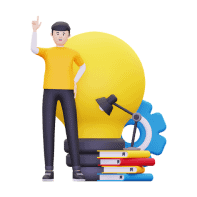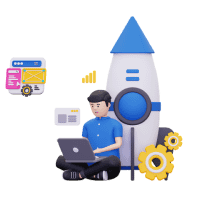Quiz/Survey Funnel
Type
Lead
Pages
3
Times
5-7 Days
Difficulty
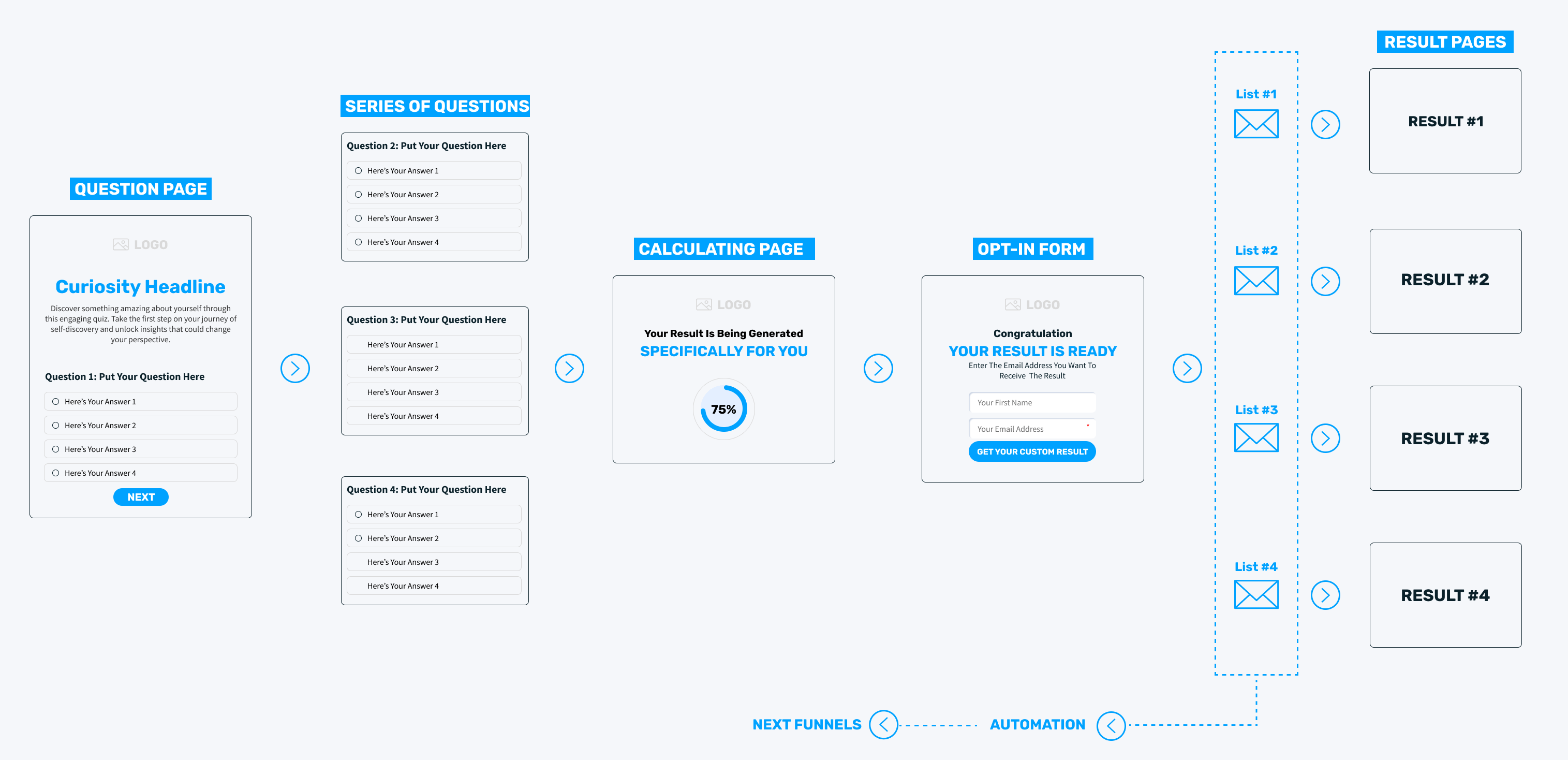
15 RESOURCES
BEST REVIEW
Build Your Ecom Or Expert Business in Just 30 Days…
Join the brand-new One Funnel Away Challenge with live training and support. $11,191 worth of value.
What Is A Quiz Funnel?
A Quiz Funnel (or Survey Funnel) consists of questions designed to categorize each visitor based on their specific needs. After completing the quiz, visitors are redirected to a customized landing page, email sequence, and sales page tailored specifically to them.
It’s a powerful way to capture leads while providing real value to your visitors. Interactive quizzes engage potential customers by offering immediate insights, making them more likely to share their contact information and become leads.
Think of a Quiz Funnel as a friendly guide who asks the right questions to understand what someone needs.
It has three main parts:
- Landing page with questions
- Form to collect contact info
- Results page with a personalized solution.
At its core, a Quiz Funnel is a conversation. And like any good conversation, it’s about making a connection. When people feel understood, they’re more likely to trust your advice and consider your solutions.
This connection naturally leads to better sales because you’re solving real problems for real people.
Here’s what makes Quiz Funnels work:
- They ask questions that show you understand your customer’s challenges
- Each answer helps narrow down the best solution
- The final advice feels personal, not generic
- People get immediate value from the results
For example, an outdoor store might use a quiz to help people find their perfect hiking boots. The quiz would ask about:
- Where they plan to hike
- How often do they hike
- Any foot problems they have
- Their budget
Based on these answers, the store can suggest the right boots that match each person’s needs. This helps shoppers feel confident in their choices and reduces returns.
The Psychology Behind Why Quizzes Drive Such High Engagement
Quizzes engage people by tapping into their basic human needs. We’re naturally curious about ourselves and love to share our thoughts.
When we take a quiz, our brains release dopamine – the feel-good chemical. This happens because:
- We get instant answers about ourselves
- We feel understood when questions match our situation
- We enjoy the surprise of discovering new things
- We like checking if our answers are “right.”
- We feel good when we complete something
Quizzes also work well because they give us personal attention. It’s like having a conversation with someone who wants to understand us.
When questions feel relevant to our problems, we pay more attention.
Most people will finish a quiz once they start.
This is because we naturally want closure. We also hope to get useful advice that can help solve our problems. The promise of getting personalized results keeps us clicking through to the end.
How Quiz Marketing Funnel Fiffer from Lead Magnet Funnel?
While a traditional lead magnet might get you some leads, a product recommendation quiz funnel typically generates more leads because it offers tailored product suggestions based on each person’s needs.
This personalized approach helps you collect valuable information about your audience while delivering quiz results that actually matter to them.
Let me explain!
With a lead magnet, you create one thing—like a guide or checklist—and give it to everyone who signs up. It’s simple but not very personal.
In Quiz Funnels, you need to spend time identifying the traffic and customizing the rest of the sales funnel based on who the person actually is.
The real power of quiz funnels shows up when:
- Your advice matches their exact needs
- Your emails speak to their problems
- Your product suggestions fit their situation
- People trust you because you understand them
- You learn what your customers want
Compared to Quiz Funnel, creating a good lead magnet is hard. You might spend hours trying to make something valuable. Sometimes, you look at competitors and still can’t find good ideas.
Quiz funnels solve this problem. You don’t need to create complex downloads. Just ask good questions, like having a helpful conversation with each visitor.
For example, a skincare brand could ask about skin type, concerns, and daily habits. Then, suggest products that meet those needs.
Yes, setting up a quiz takes more work at first, but it helps you better understand and serve your customers.
Types Of Quiz Funnel
When we say “Quiz Funnel,” we mean any kind of quiz that helps your business learn about customers. It’s easier to say “quiz” than list all the different types each time.
Here are the six types, explained simply:
1. Quiz
A Quiz keeps things light and fun. It mixes entertainment with learning, like those personality quizzes you see on social media. While people enjoy answering questions, you get to learn about what they like and what they know.
2. Assessment
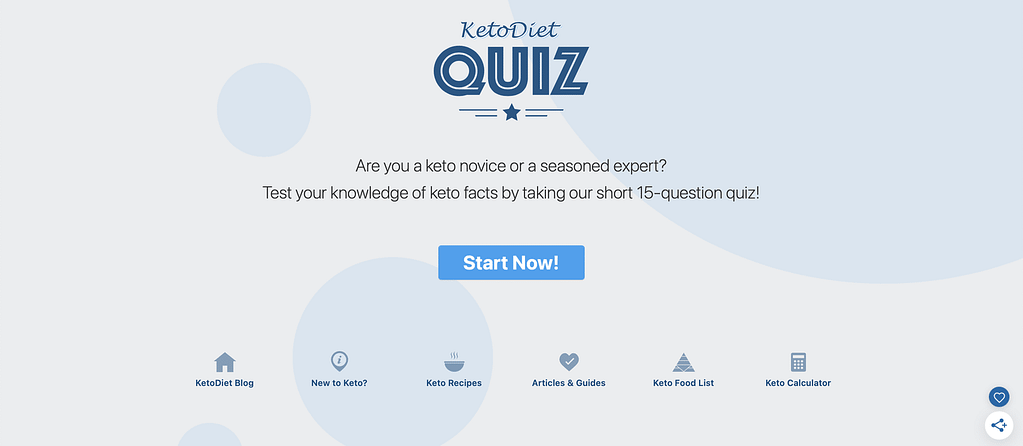
An Assessment digs deeper. It looks at someone’s skills or knowledge and gives them personal feedback. For example, a fitness coach might assess a client’s workout habits and goals.
3. Diagnostic
A Diagnostic helps find specific problems. It’s like going to a doctor – you answer questions about your symptoms, and the diagnostic suggests solutions. A business consultant might use this to spot issues in a company’s marketing strategy.
4. Questionnaire
A Questionnaire just gets straight to the point. It asks direct questions to gather information, like a survey. Many businesses use these to learn more about their customers’ needs.
5. Scorecard
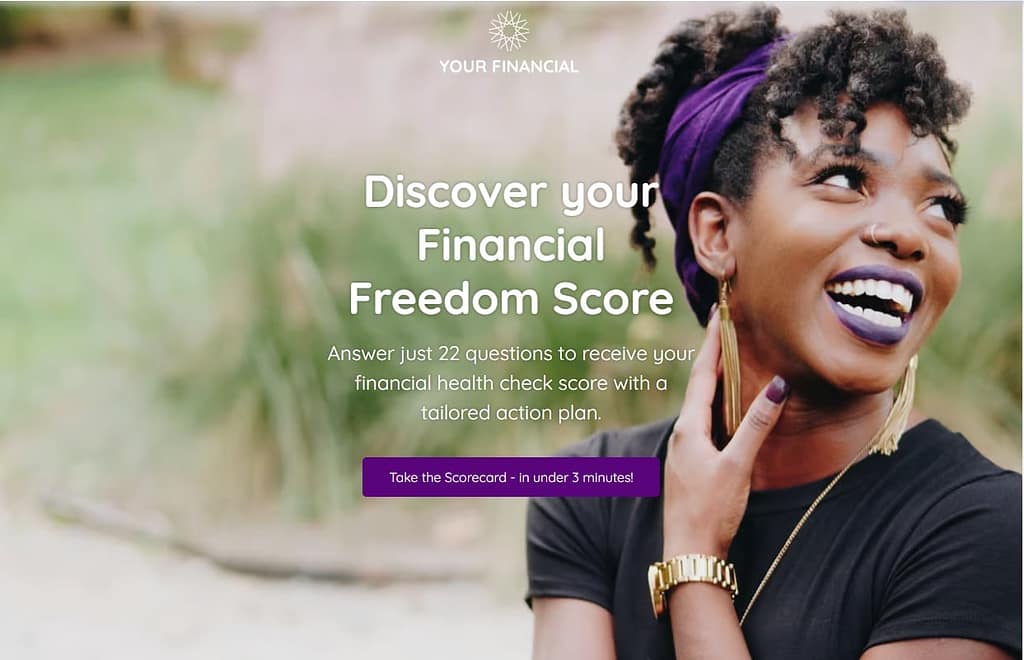
The scorecard gives you points or grades in different areas. A financial advisor might use this to rate how well you’re saving and investing.
6. Segmentation Funnel
Segmentation Funnel groups people based on their needs. A clothing store could use this to separate shoppers into groups like “casual wear,” “work clothes,” or “special occasions.”
Who is a Quiz Funnel For?
B2B
In most B2B markets, the total market can be much smaller than the B2C market. So, the sales process can be more complex.
Quiz Funnels help you learn exactly what your clients need before talking to them.
Let’s say you sell accounting software.
Your quiz asks, “How many invoices do you handle monthly?” and “What’s your biggest bookkeeping headache?”
When Kevin from a growing startup says, he processes 500 invoices and struggles with payroll – BINGGO!
You know exactly how to help him.
Your sales calls improve because you’re not wasting time figuring out basic stuff. Even better, you will only spend hours with companies ready to buy.
I’ve seen businesses double their success rates by knowing the right things about their clients upfront.
B2C
Think of a quiz as having a friendly team of a thousand helpful salespeople cheering you on as you shop!
It gives every customer one-on-one attention without needing extra staff, making the experience feel warm and personal.
Imagine walking into a skincare store filled with all sorts of products and brands. It can be a bit overwhelming, right?
That’s where a fun and engaging quiz comes in to save the day!
The quiz could start by asking about your skin type—whether it’s oily, dry, or somewhere in between. Then, it might dive into your skin concerns, like pesky acne or fine lines, and even ask about your daily routine to understand how you currently care for your skin.
Instead of feeling lost while staring at a dizzying display of 50 different products, you simply answer a few friendly questions from the quiz.
When you finish, it’s like getting a personalized beauty recommendation straight from a trusted friend!
For instance, it might say, “Hey there! Based on what you’ve told us, we think you’d love this vitamin C serum to brighten those dark spots and this lovely moisturizer to keep your dry skin hydrated.”
It’s like having your own beauty expert right at your fingertips—offering you advice and tips without any awkward sales pitches. This way, you can shop confidently, knowing you’ve found the best products tailored just for you!
Sell Multiple Products
When you sell many different things, a quiz is your best friend.
Instead of customers feeling stuck between choices, the quiz guides them to the perfect pick.
Look at Warby Parker’s glasses quiz. Instead of scrolling through hundreds of frames, it asks about your face shape and style preferences and then shows frames that’ll actually look good on you.
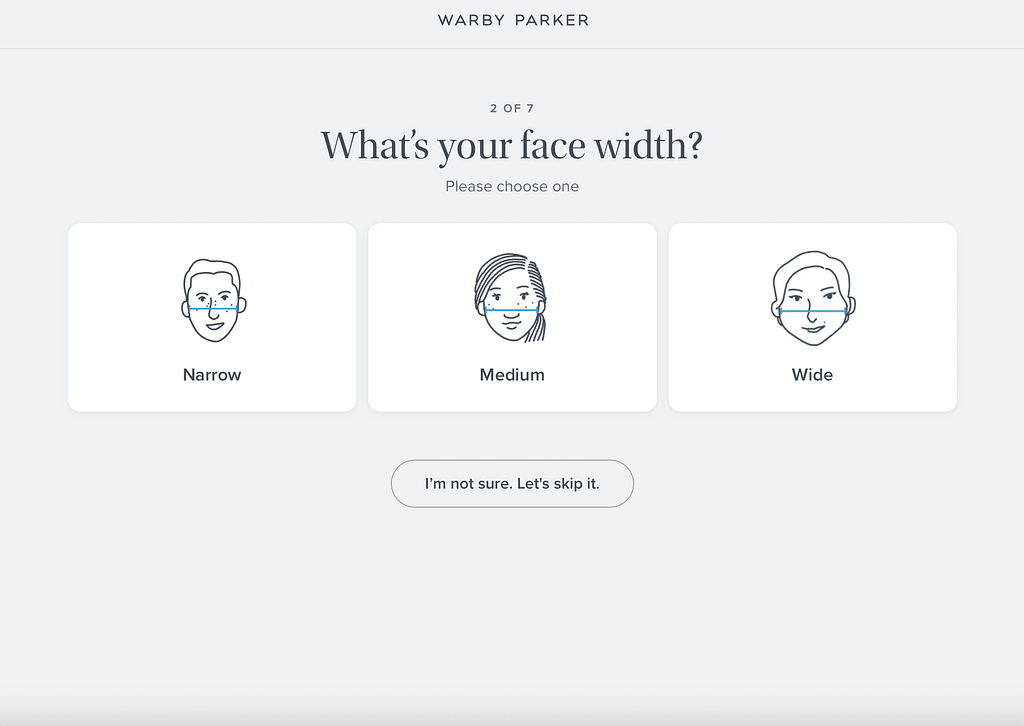
No more ordering ten pairs, hoping one will work!
The quiz now guides customers to their perfect choice, resulting in happier customers and fewer returns. You can suggest products that work well together, often leading to bigger sales.
High-Ticket
For expensive stuff, the quiz becomes your time-saver.
Take a company selling $5,000+ in marketing services. Their quiz asks about business goals, current marketing efforts, and budget.
If someone only wants to spend $500, they are directed to helpful free resources or online courses.
That makes sense.
It finds serious buyers who have the budget and are ready to buy.
Your sales team loves this because they only talk to really interested people. Companies save countless hours by letting the quiz do the initial screening.
Low-Ticket
Check out Function of Beauty’s shampoo quiz.
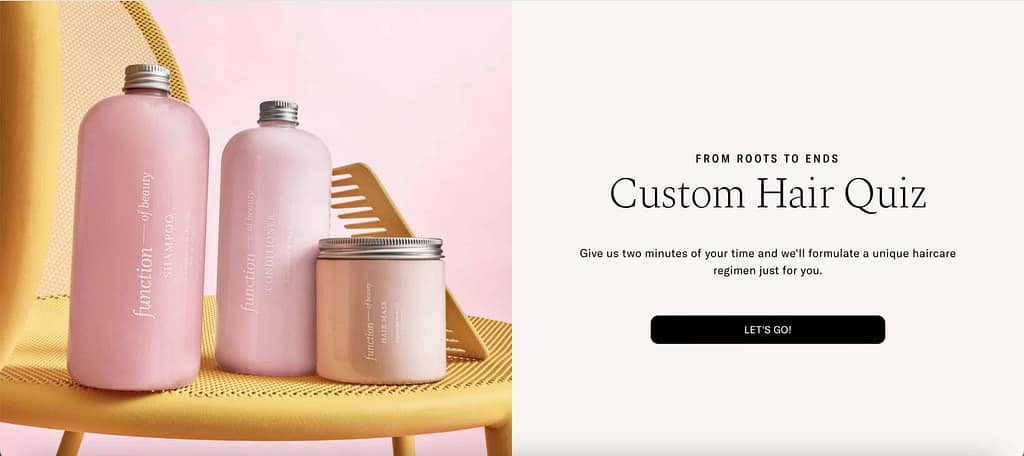
Instead of buying random hair products, you tell the quiz about your hair type, concerns, and preferred smells.
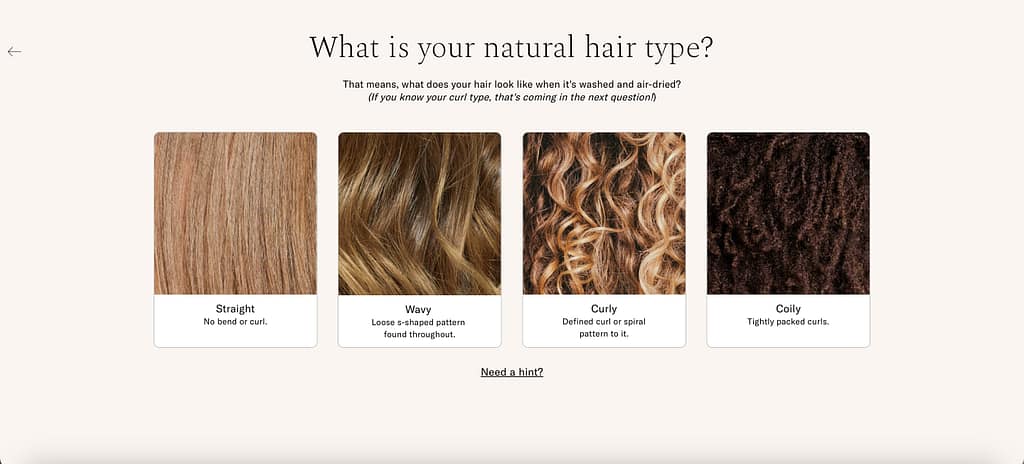
It then creates your perfect hair care set with anti-frizz shampoo, moisture conditioner, and maybe a leave-in treatment.
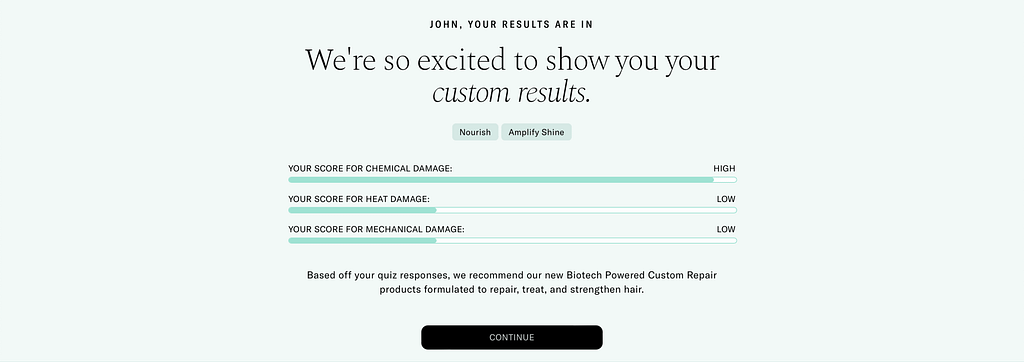
The quiz perfectly bundles these together.
Instead of buying just one thing, customers get a complete set of products that work for them. The quiz acts like a personal shopper, suggesting items that make sense together.
Customers love this because it feels like getting expert advice without talking to anyone. And you’ll love watching your average order size grow!
Four-Part of “Clickfunnels” Quiz Funnel
Clickfunnels’ old homepage is a great example to help you understand how a typical quiz funnel works.
1. Question Page: Visitor Entry Point
They grabbed attention with this killer headline: “Take This Short Quiz To Find Out Which Funnel Will Work The Best For YOUR Specific Business.”
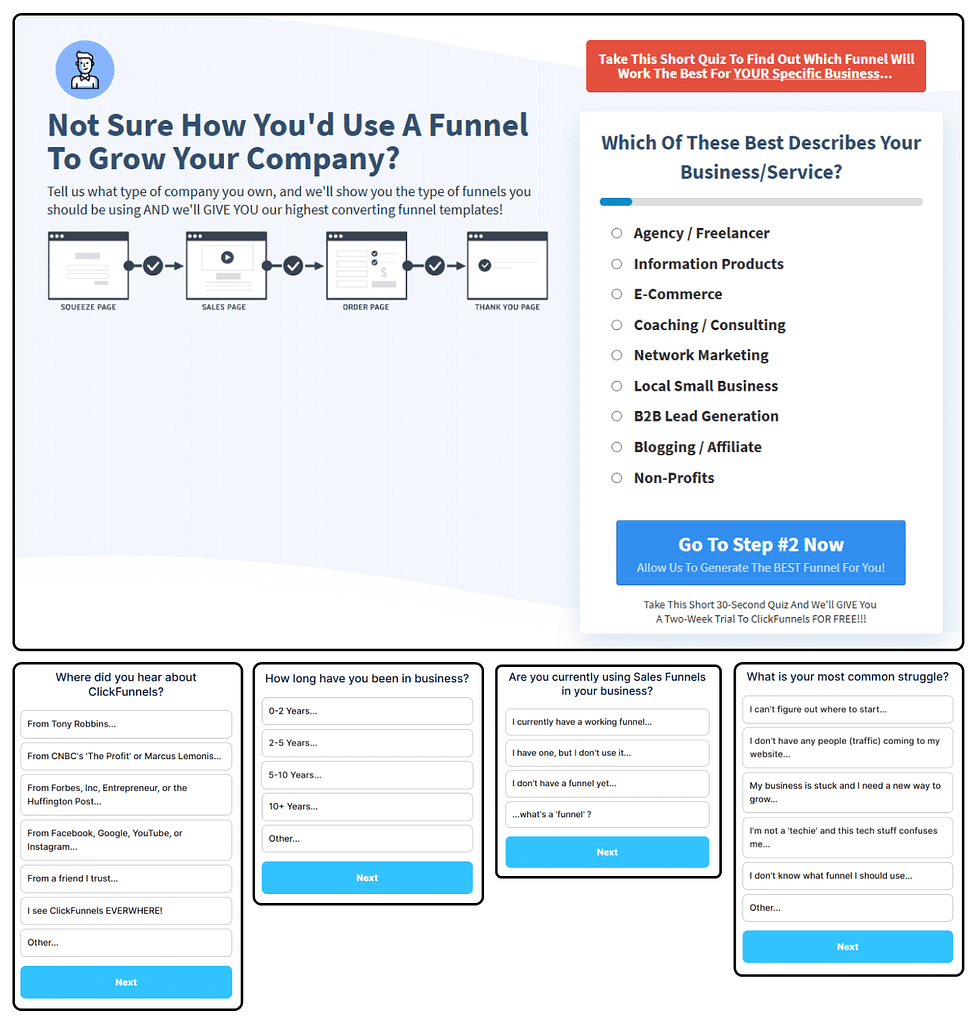
Instead of boring visitors with the same old sales pitch, they promised to solve YOUR specific business problems.
The quiz format turned visitors from passive browsers into active participants. And once people start answering questions about their business, they’re invested in seeing their results.
Their first question got straight to the point: “Which of These Best Describes Your Business/Service?”
- Agency/Freelancer
- Information Products
- Blogging/Affiliate
- etc
This wasn’t just any question. It was THE question that sorted visitors into the perfect group.
Sure, they asked more questions later, but that first was the key. It decided which path you’d take and what solutions you’d see.
2. Opt-in Form/Page: Convert Visitors To Leads
After I finished the quiz, a “calculating” screen popped up, and I couldn’t help but feel a bit curious! I decided to give their quiz a few tries to see how it all worked.
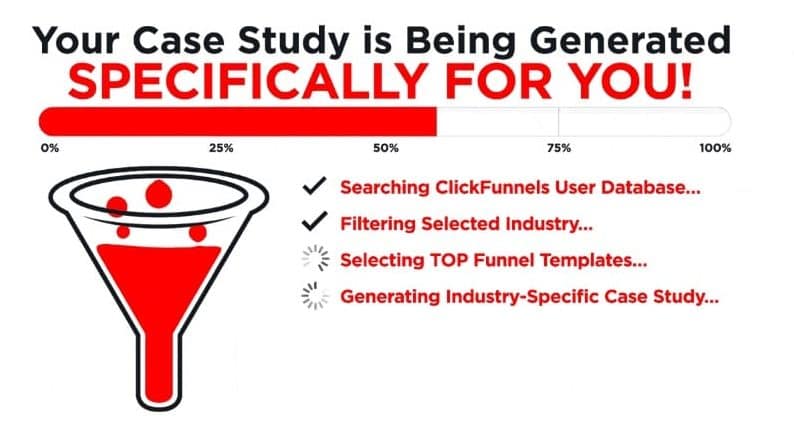
When I selected “Blog/Affiliate” as my business type, I was greeted with an opt-in form featuring a case study from Sara Wells, who is all about blogging and affiliate marketing.
It really caught my eye because it’s exactly what I’ve been looking for!
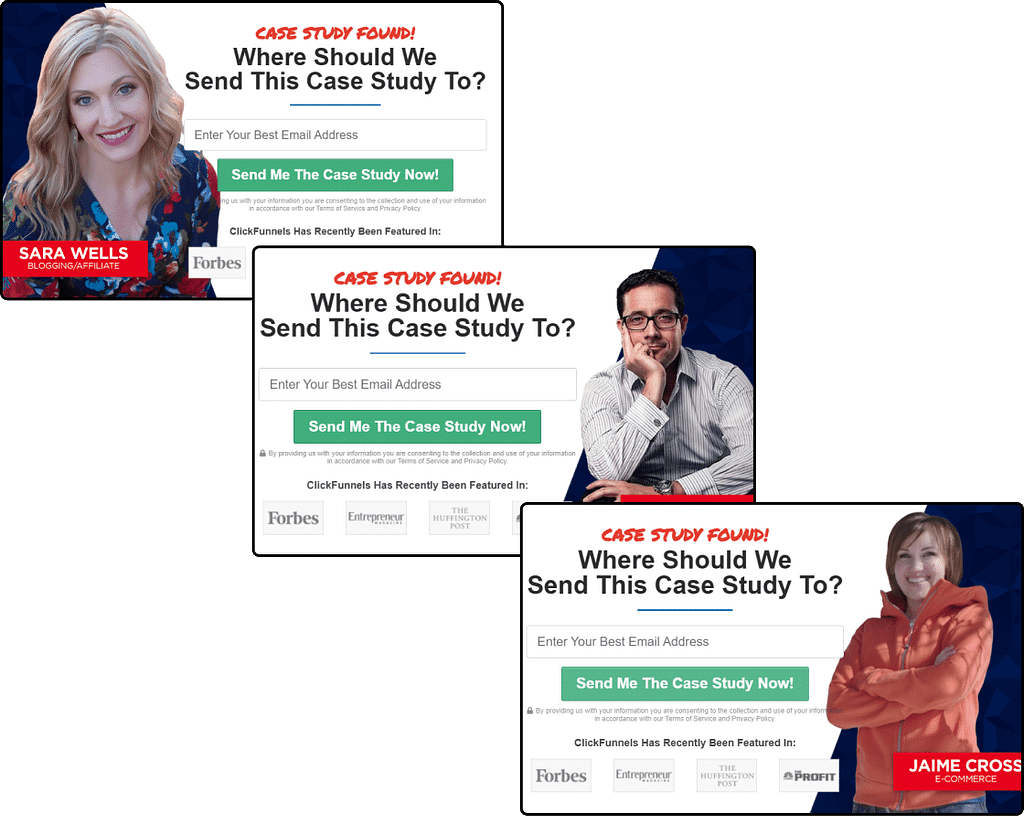
Then I switched to “E-commerce.” This time, the form showcased a store owner who’s absolutely rocking online sales. Just for fun, I chose “B2B” next, and sure enough, there was a new form with inspiring stories from service businesses.
No generic stuff
Even though I was just experimenting, I felt the urge to enter my email!
Why? They provided solid proof that their tips worked for people in situations like mine, which made me really excited!
3. Result Page: Personalize Sales Message For Different Outcomes
After giving my email, I got a sales page that matched my quiz answers.
When I picked “Blogging/Affiliate,” I saw A big headline: “Sarah Is Selling Other People’s Products, JUST LIKE YOU!”
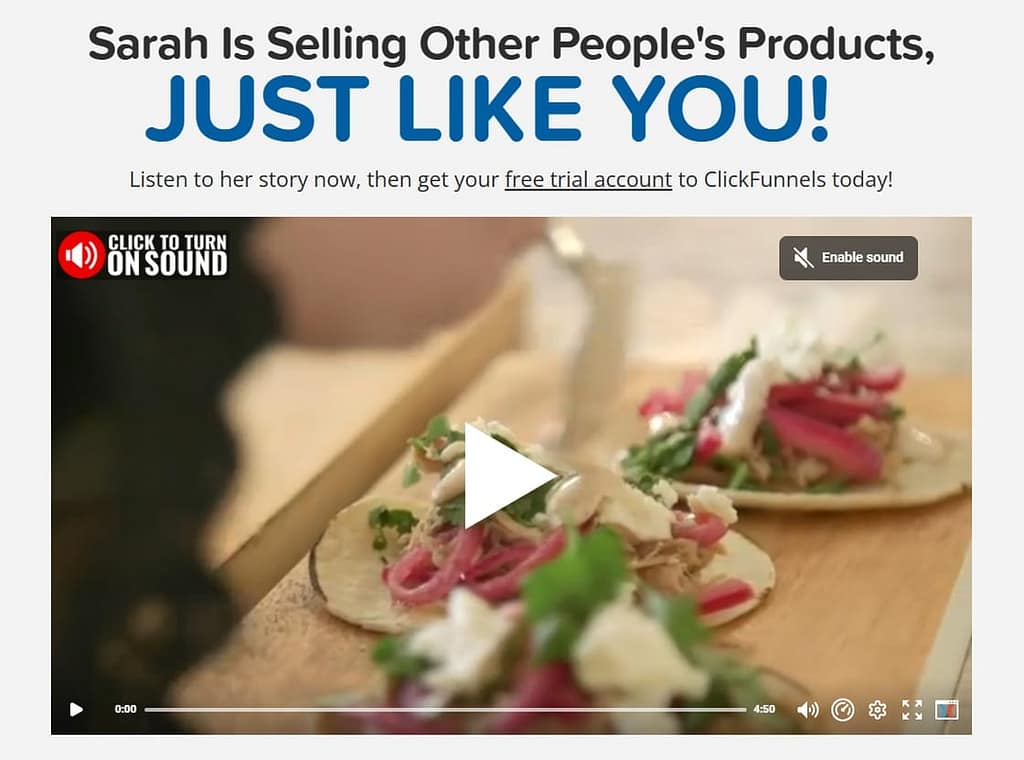
The video showed Sarah, a real affiliate marketer. She talked about stuff I deal with:
- Getting more people to click her links
- Making better commissions
- Standing out from other affiliates
She shared how Clickfunnels helped fix these problems. I could tell this wasn’t some fake story – she knew exactly what I was going through.
Just to check, I tried different answers:
- Picked “Information Products”? Natalie success story
- Chose “Coaching”? Garrett J White’s story about how he gets more clients
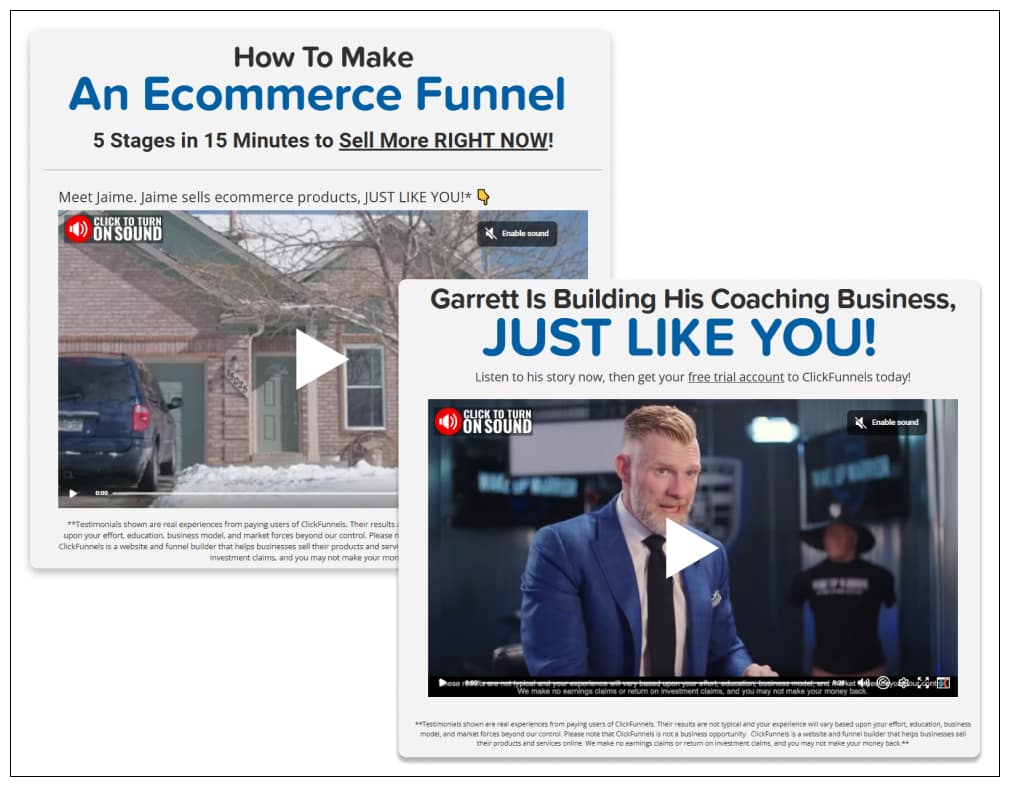
This works because:
- You see someone like you winning
- Their problems match yours
- Their solution could work for you, too.
4. Follow-Up Funnel: Relationship Building
When you take their quiz, they learn important things about your business. This helps them send you messages that actually matter to you.
For example:
- They know what type of business you run
- They understand your main challenges
- They see what stage you’re at
So when they reach out, everything fits your situation. No random offers or irrelevant advice.
If you’re an affiliate marketer, you get affiliate marketing tips. If you run an e-commerce store, you get store-related advice. Simple as that.
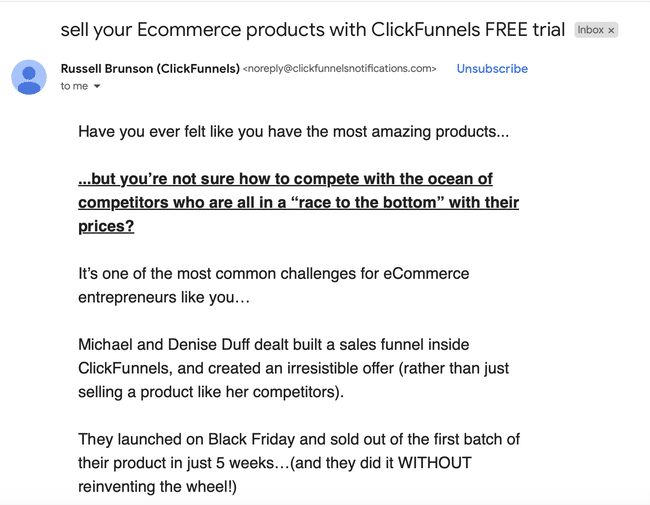
Why this works:
- Messages align with your needs.
- Advice is specific to your business.
- Solutions address your real challenges.
It’s just smart business – talk to people about what matters to them, not about random stuff they don’t need.
You can do this, too. Use quiz answers to better understand your customers. Then, send them the help that actually fits their situation.
Still with me? Great, now we go deep into how to create a quiz funnel that converts.
How To Create A Successful Quiz Funnel? (Step-By-Step Guide)
Step 1: Question Sequence Strategy
For beginners, you’ll want to starting with 4-5 questions, and ONE of them are decide where your visitor will land in.
In Ryan Levesque’s book, “Ask,” he refers to it as a “Bucket” question. This type of question effectively organizes individuals into distinct groups, much like how one sorts mail into different boxes.
Now, here are some ideas for structuring your quiz funnel questions:
1. Gather demographic (Age and gender)
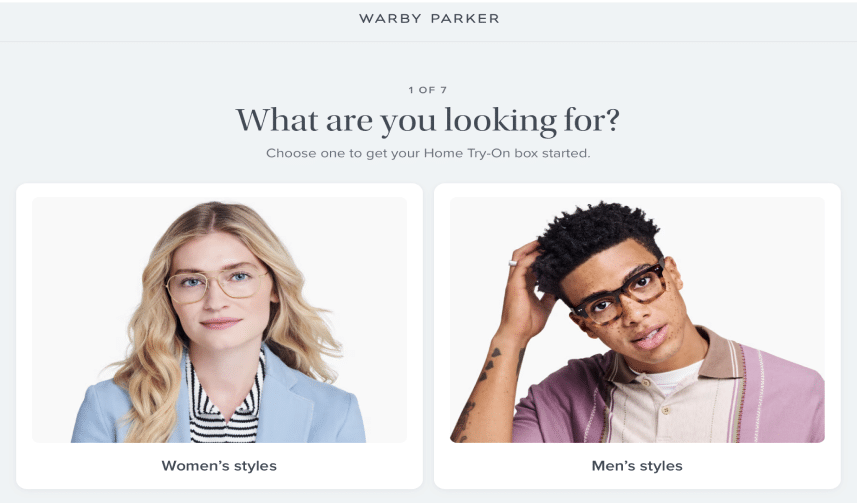
2. Opening Questions: Easy, engaging questions to draw participants in (What’s your main goal for [topic]?; How would you describe your experience level with [topic]?; Which of these best describes your current situation?)
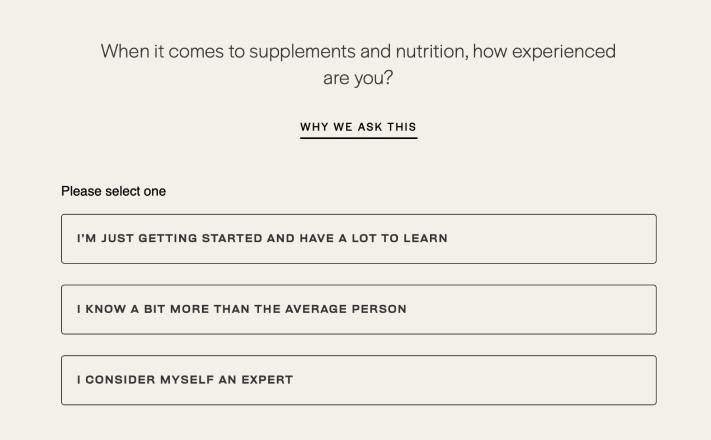
3. Questions based on the subject (Do you have a sales funnel?; What is your natural hair type?; Which best describes your smile?; etc)
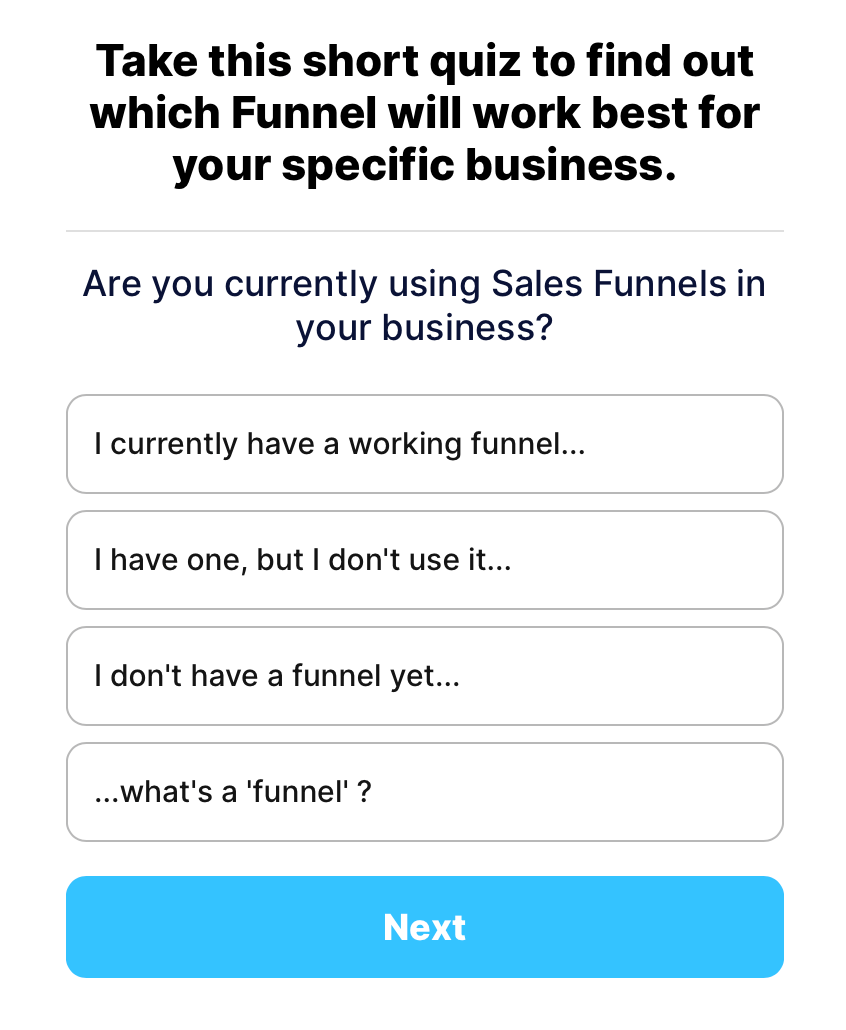
4. Problem-Identifying Questions: Uncover pain points and challenges (What’s your biggest struggle with [topic]; How often do you encounter difficulties with [specific aspect]?; On a scale of 1-5, how satisfied are you with your current [topic] situation?)
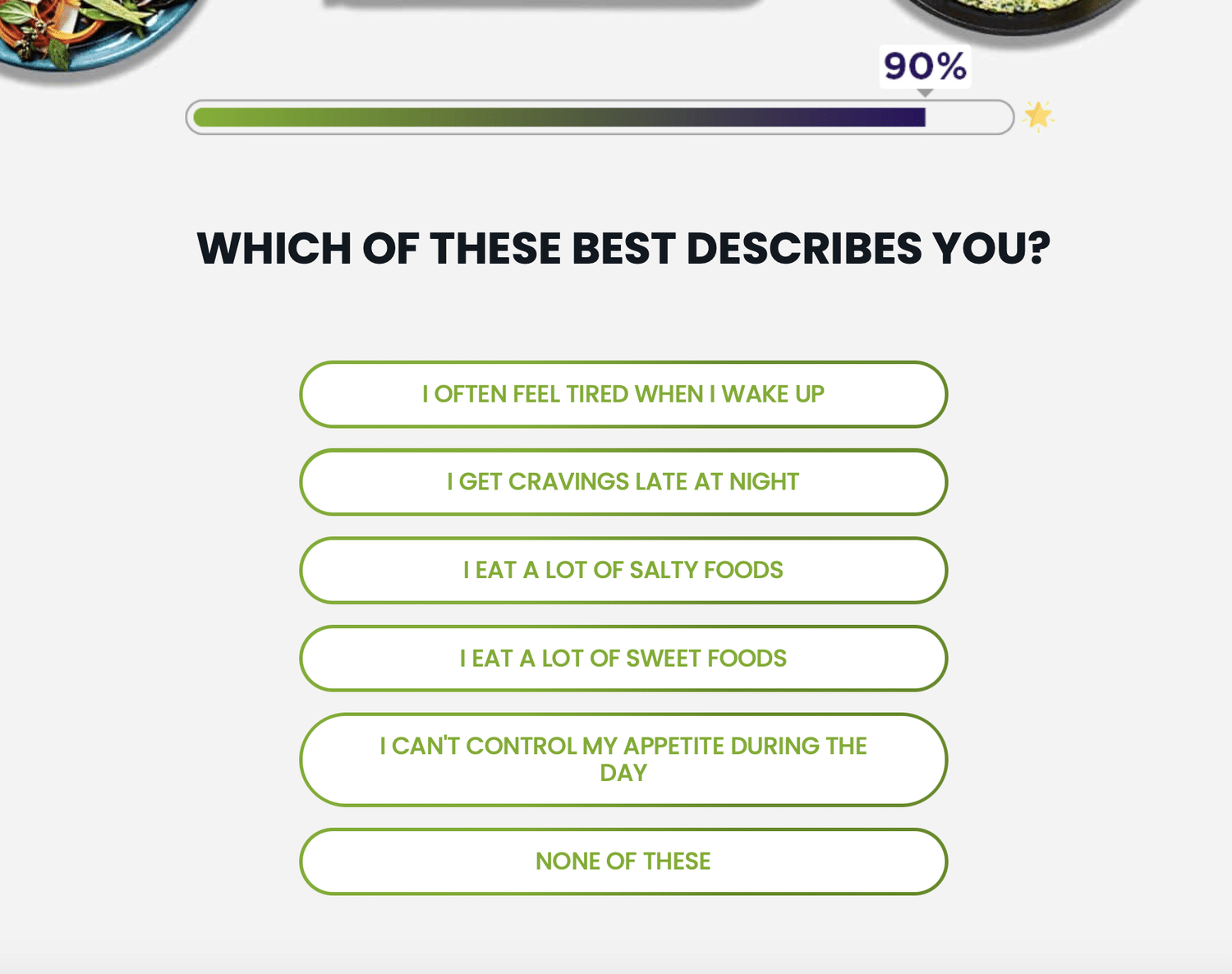
5. Preference Questions: Learn about the people’s tastes and inclinations (Which of these [topic-related] styles do you prefer?; If you had to choose, would you prioritize [option A] or [option B]?; What’s your ideal outcome for [topic]?)
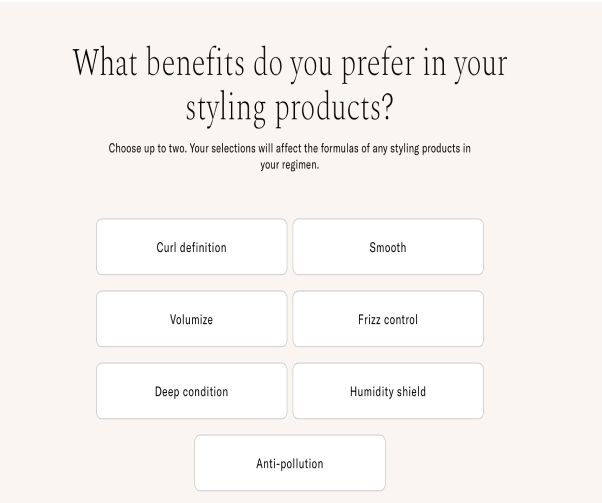
6. Visualization Questions: Help people imagine ideal outcomes (Where do you see yourself in [timeframe] if you achieve your [topic] goals? What would your life look like if you overcame your biggest [topic] challenge?)
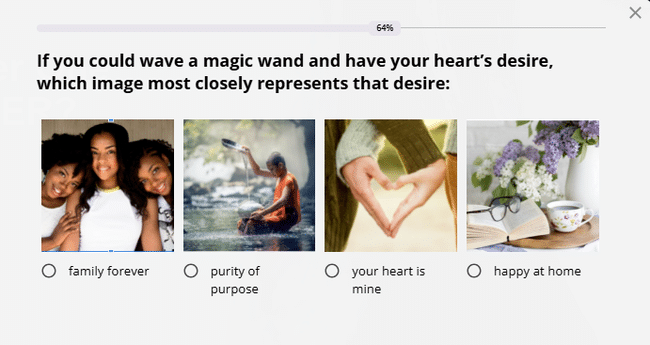
7. Budget/Investment Questions: Gauge willingness to invest time or money (What’s your budget range for [topic-related products/services]?; How much time will you dedicate to improving your [topic] skills?;
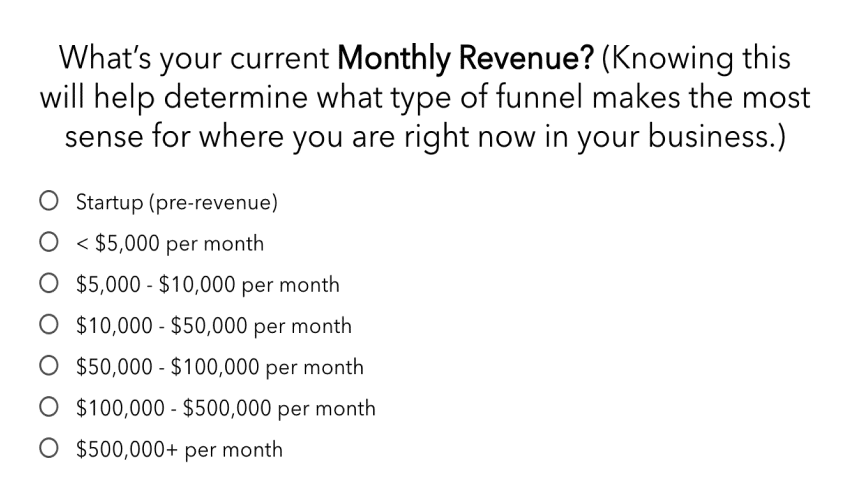
💡 Pro Tip: Keep your surveys short and sweet! Use everyday words, stick to 10-15 questions, and mix up question types (multiple choice and written answers). Think about your audience and what information you need from them.
Step 2: Create A Quiz Landing Page That Hook Visitors
Now your questions are ready, it’s time to build a home for them.
After “Funnel Hacking” over 20 successful Quiz Funnels, I found two effective question-page layouts.
1. “Curiosity” Question Pages
The page starts with an intriguing question or statement that makes people think, “I want to know more!”
Let’s see the example below.
The quiz starts with the attention-grabbing headline, “Is Invisalign right for you?” This immediately makes visitors curious about what they might learn.
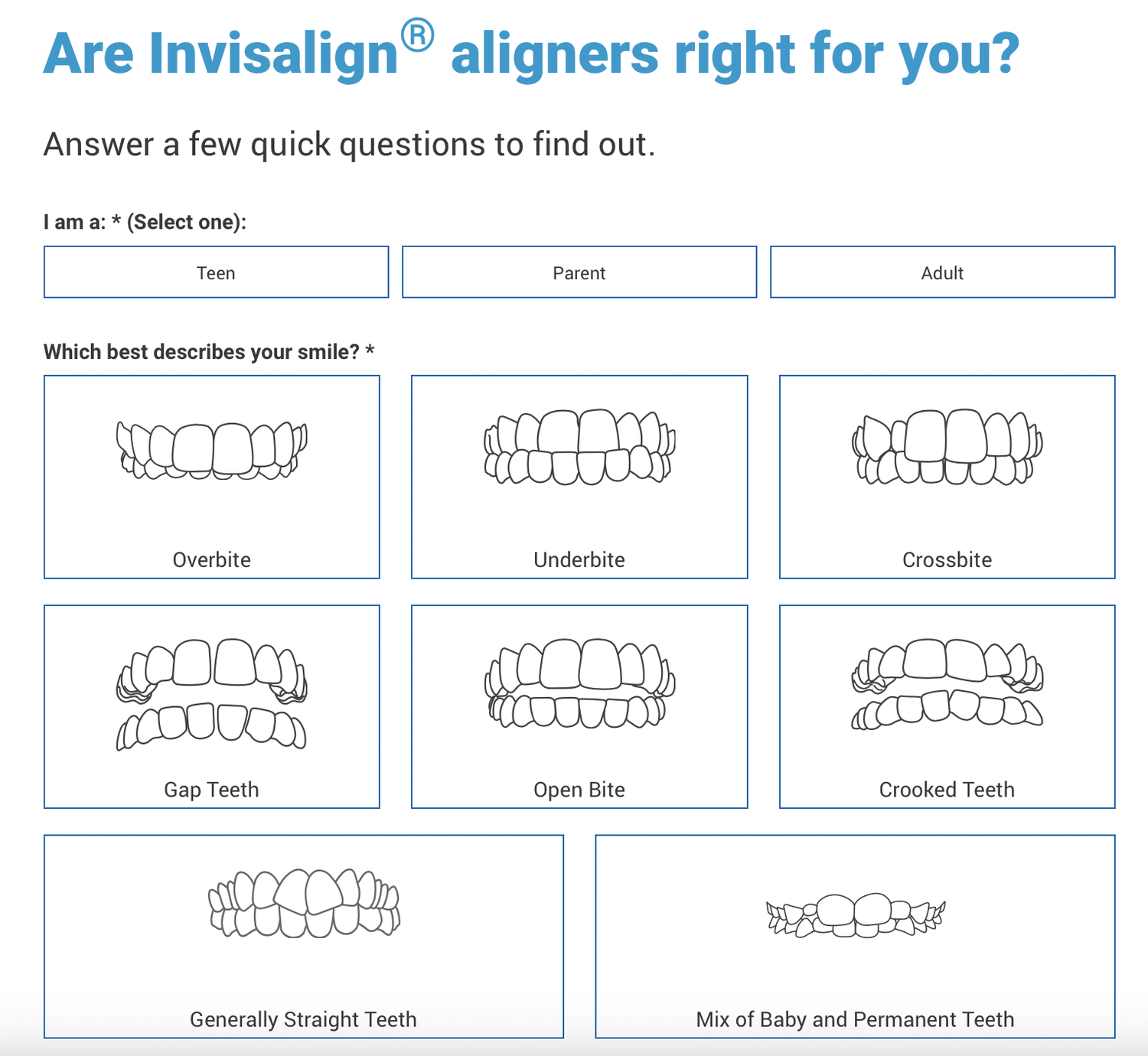
Another example is the Manifesion 3.0 program. They create a curiosity headline: “Harvard-trained psychologist reveals the 3 levels of manifestation ability.”
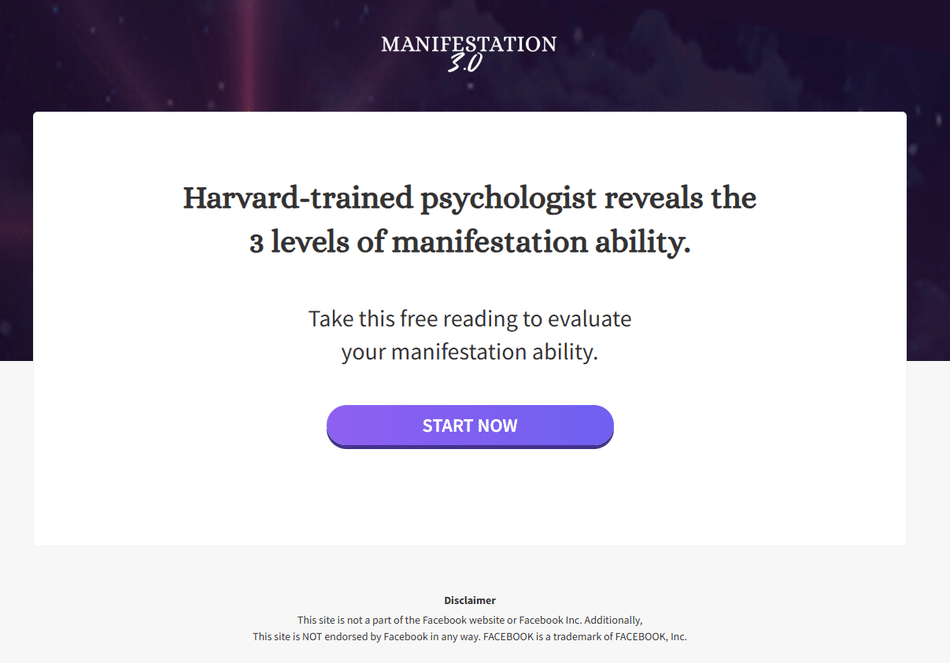
The “Harvard-trained psychologist” part instantly signals expertise. It’s like having a top doctor offer to share their knowledge with you.
This makes people trust what comes next.
The word “reveals” suggests you’re about to learn a secret.
2. “Personalized” Question Pages
Conversely, the “Personalized” approach takes a different path. Keto Creator’s headline: “Take A 1-Minute Quiz To Create Your Custom Keto Diet,” is a perfect example of this style.
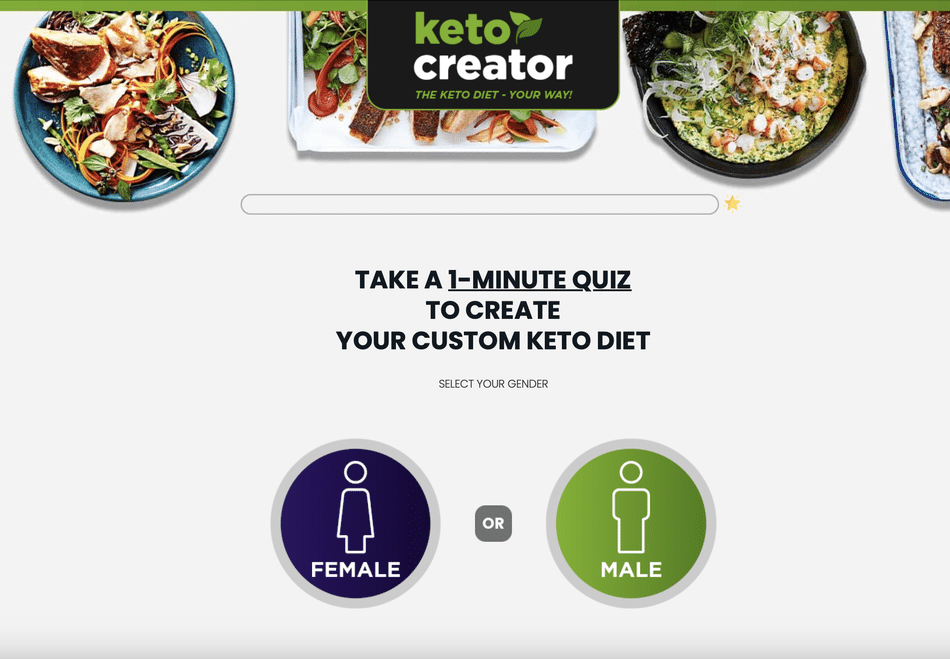
Here’s why it works so well:
- Promises a custom solution (not a generic plan)
- Mentions it only takes 1 minute (removing the time barrier)
- Uses the word “CREATE” (implies getting something tangible)
- Includes “YOUR” (makes it personal)
- Specifically mentions “KETO” (targets the right audience)
The Sirtfood Diet takes a similar approach to “Create Your Own Sirtfood Diet.” It’s direct and puts control in the visitor’s hands.
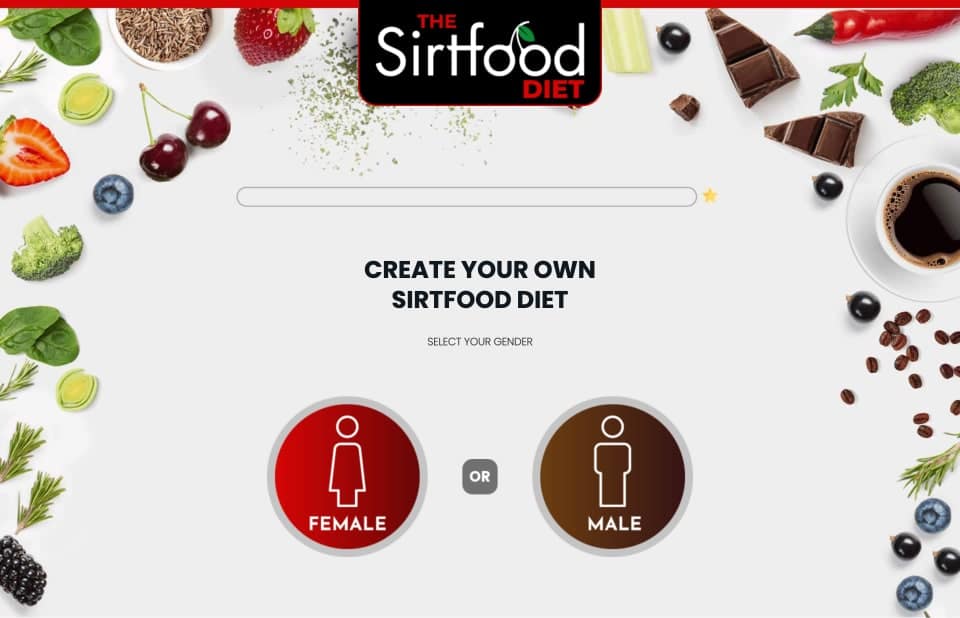
Using “Your Own” makes people feel like they’re getting something tailored to them, not just another generic diet plan.
It feels less like taking a quiz and more like using a personalized planning tool.
Gainful’s approach is particularly clever because it combines both strategies.
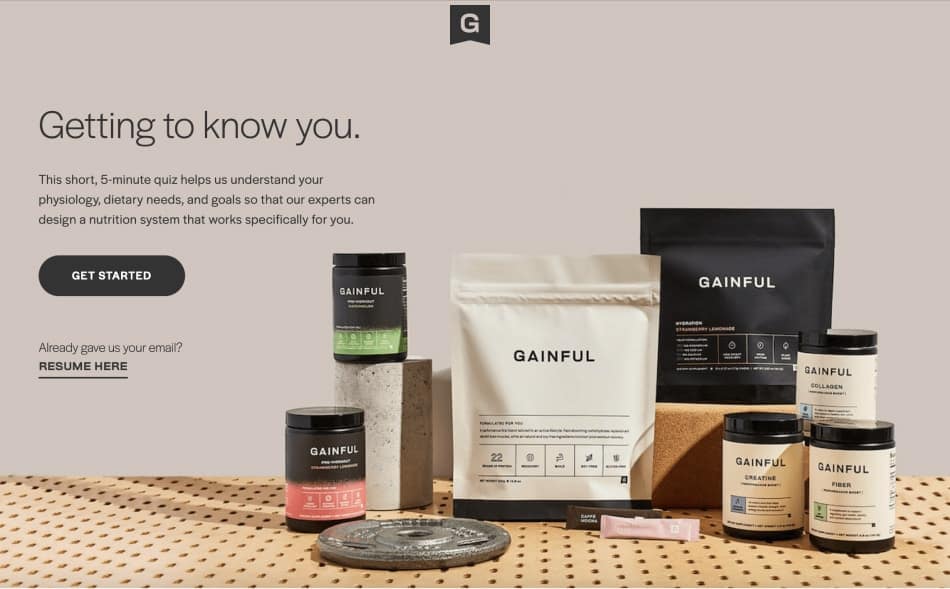
They start by saying, “Getting to know you,” like a friend would. Then they tell you exactly what will happen: “Take 5 minutes to tell us about yourself, and our experts will make a plan that works just for you.”
It’s like conversing with a knowledgeable friend who wants to help you succeed.
I’ve reviewed many landing pages and found that your quiz needs to deliver what you promised.
If you’re promising personalized recommendations, go with the custom approach. Curiosity might work better if you reveal insights or test knowledge.
💡 Pro Tip: Start with the Curiosity approach for most quiz funnels – it’s simpler and gets better engagement. Save the Personal Plan style for marketers who already know how to segment audiences, create user personas, and deliver tailored quiz results. This advanced approach works best when you have experience mapping complex user journeys.
Step 3: Create an Opt-in Form To Convert Them To Leads
After someone finishes your quiz, avoid jumping straight to asking for their email. Instead, show them a “calculating results” page.
I like to add a progress bar or loading animation here – it makes the whole process feel more valuable. Think about it like building anticipation for their personalized results.
The Keto Creator quiz does this really well.
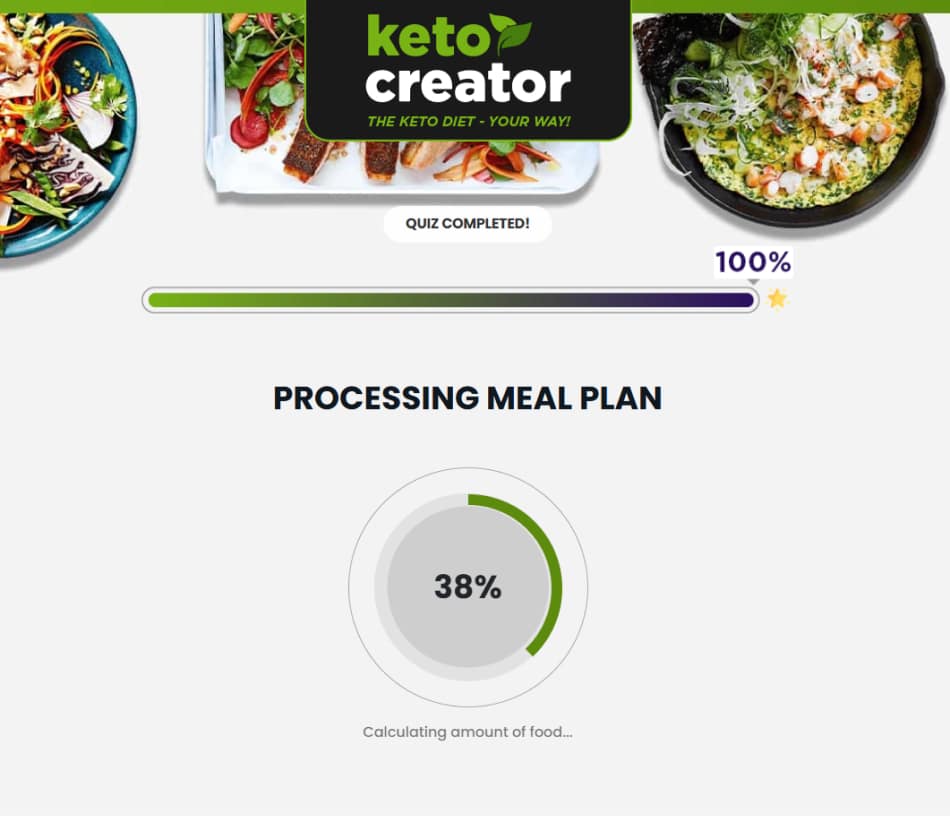
They show a page that says “Processing Meal Plan.”
This makes people feel like real work is happening behind the scenes to create something just for them.
Then comes your opt-in form, where you ask for their email to deliver their results. Keep it simple with just name and email fields, plus a clear button like “Get My Custom Plan” or “See My Results.”
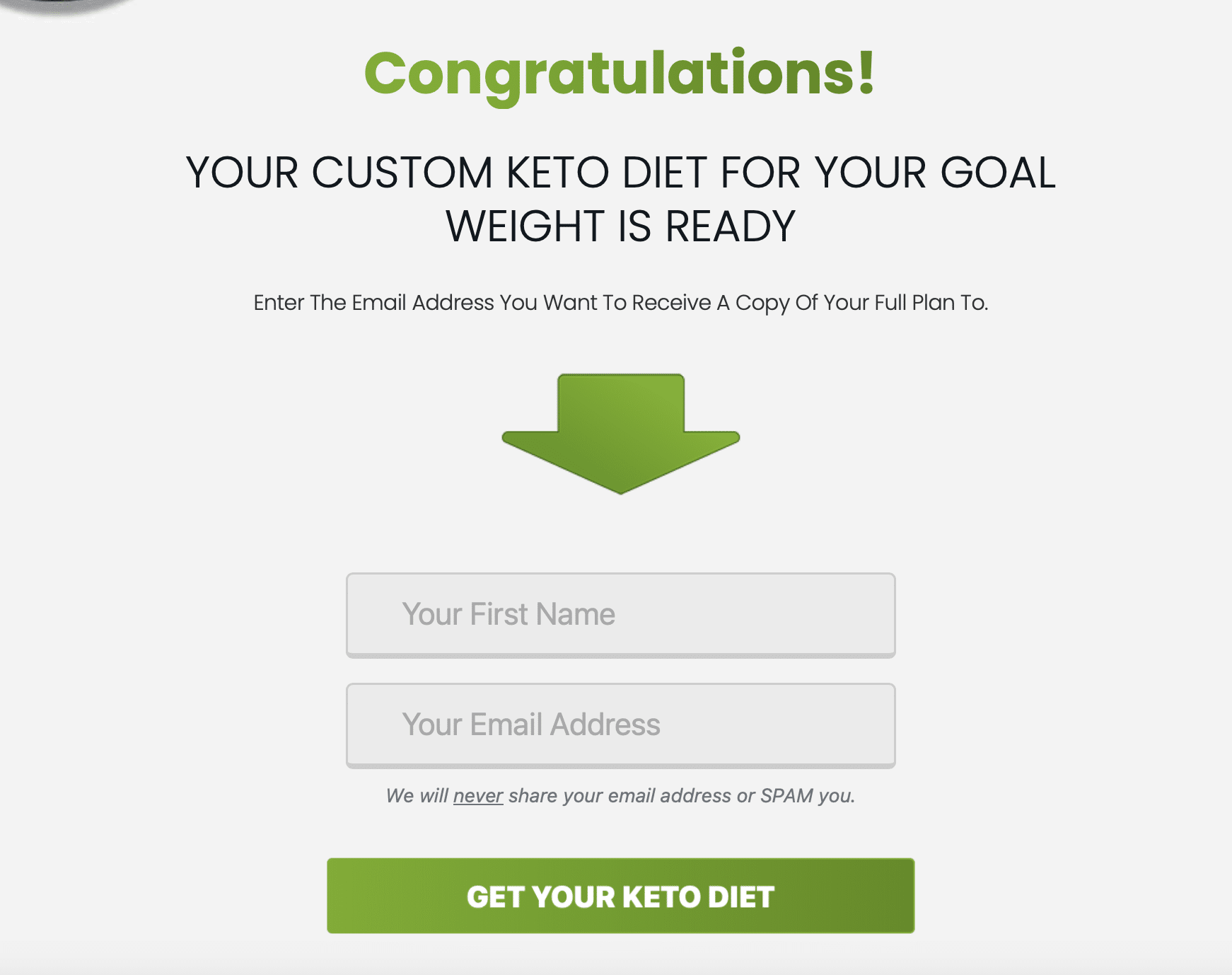
💡 Pro tip: Add social proof or show a small notification like “387 people got their custom plan today,” or add a few testimonial snippets like “This quiz helped me finally understand what I was doing wrong!” Keep it real and specific. People are likelier to share their email when they see others have done it, too.
Finally, you will want to add an exit-intent popup. This is your safety net for catching people who try to leave without giving their email.
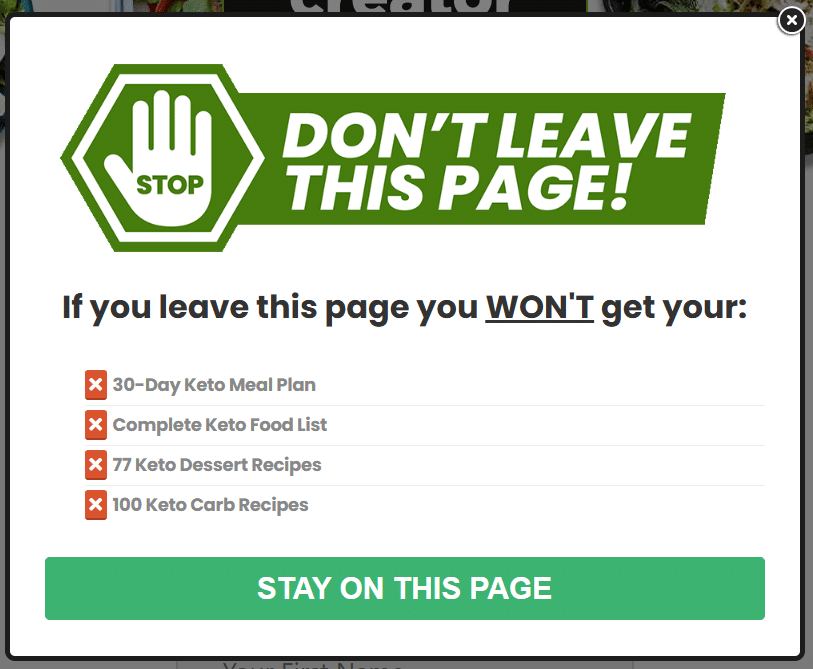
Keto Creator nails this with their exit popup that says:
“If you leave this page you won’t get your:
- 30-day keto meal plan
- Keto food list
- Dessert Recipes
- Keto carbs Recipes.”
It reminds people of everything they’ll miss out on if they leave.
Step 4: Design Your Quiz Funnel’s Result Page
Your results page matters because it’s where you either deliver on your promise or start building a relationship that leads to a sale.
There are two approach options for your results page, and both can work great:
- Simple Results + Email Follow-up:
- Results + Direct Offer
There are 5 essential elements on your Result Page that you can follow:
Section 1: Start With Their Results
After they’ve shared their email and waited through that “calculating” page we discussed earlier, give them what they want immediately.
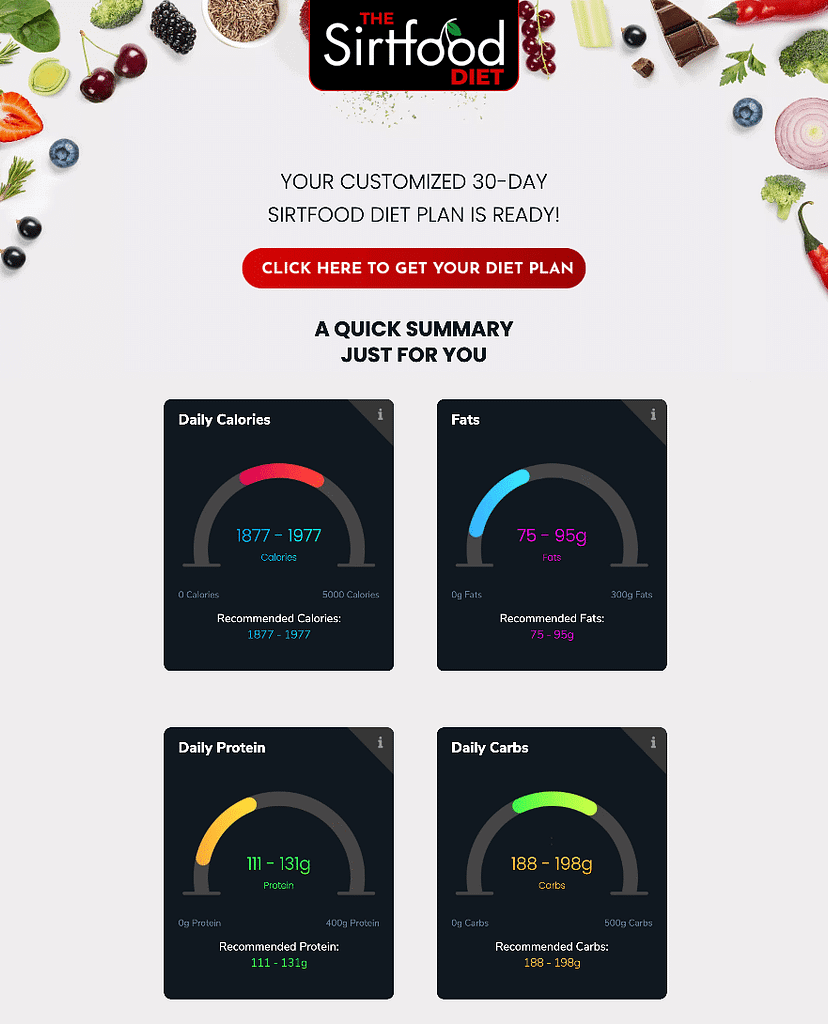
Put their quiz results right at the top, where they can see them without scrolling.
Section 2: Add a Pain Point Headline
This is where you connect with their challenges.
Look at how ClickFunnels does it: “Writing content for a blog or affiliate page is easy. (That’s Why Many People Start). Getting new traffic to it, and being profitable is not. (That’s why so many QUIT.)”
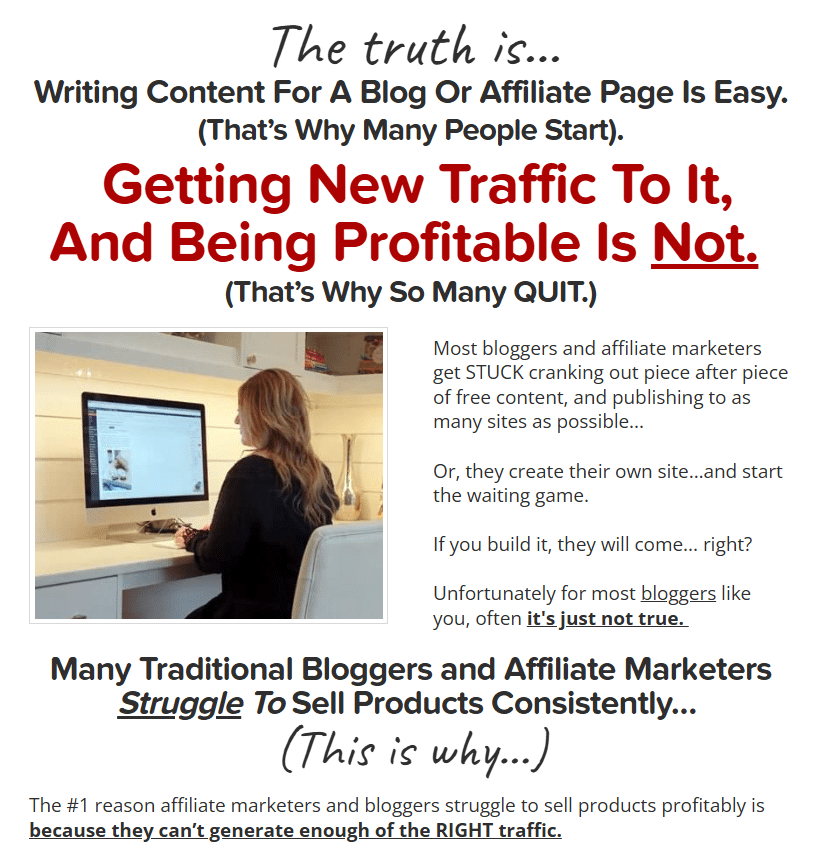
The pain points are “getting new traffic” and “being profitable.” They take what you learned from the quiz and show you really understand their struggle.
3. Present Your Solution
Now’s the time to show how you can help. Don’t just throw any offer at them – use what you learned from their quiz answers to suggest something that makes sense for them.
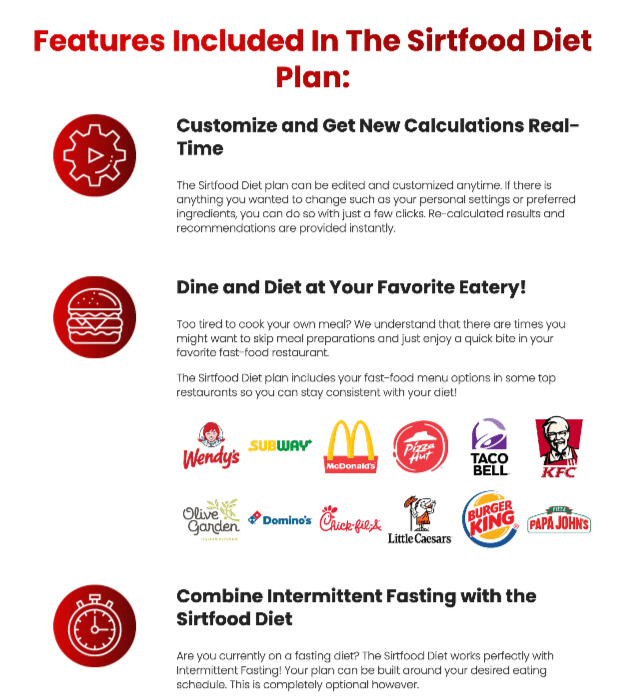
If their answers showed they’re beginners, offer your beginner-friendly solution.
4. Show Some Proof
Add testimonials from people like them.
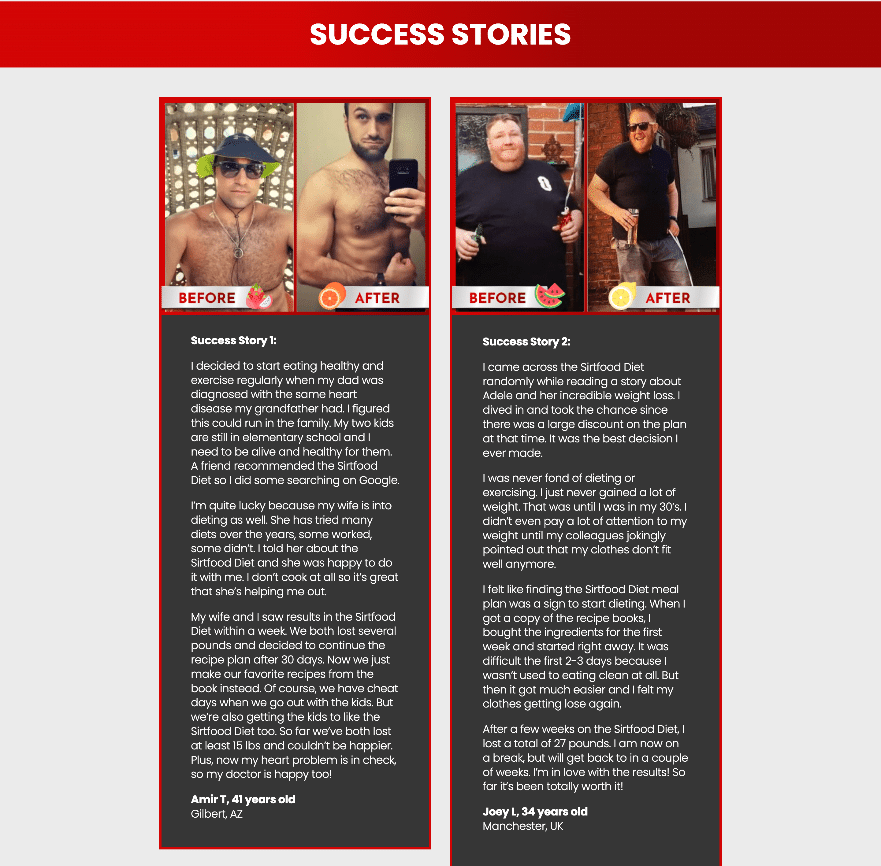
If someone got a “beginner” result, show them how other beginners succeeded with your solution. Keep it real and relevant to their situation.
5. End With Clear Next Steps
Make it super clear what they should do next. Your button SHOULDN’T just say “Buy Now” – make it specific to them, like “Start Your Custom Plan” or “Begin Your Journey.”
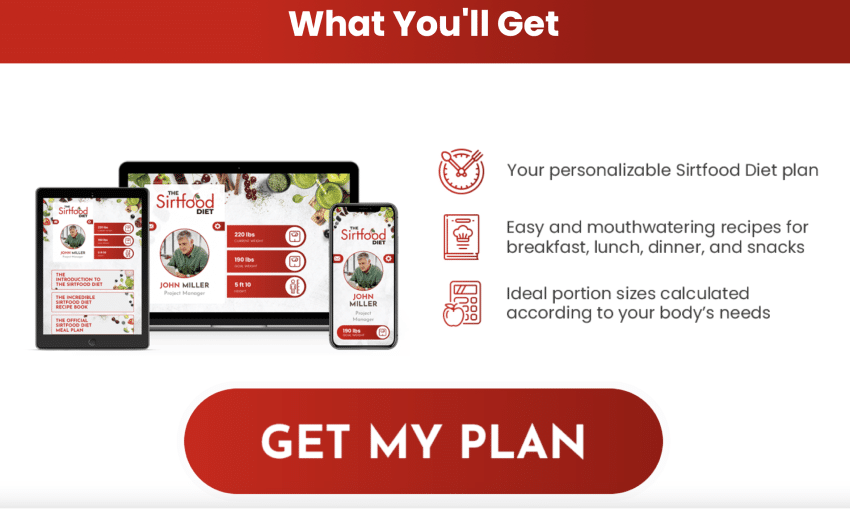
💡 Pro tip: Show personalized product recommendations immediately after the last quiz question, while the user’s interest is at its peak. Pair each recommendation with a specific insight from their quiz answers to explain why it’s perfect for them.
Step 5: Write Your Email Sequence
Getting emails from your quiz is pure gold. Here’s why:
If you kept your results page simple, perfect! You’ve given them their results and now have the chance to send them exactly what they need. It’s like having a direct line to their inbox.
Even if you made an offer on the results page, your email list is crucial. Not everyone’s ready to buy right away, and that’s okay! Your emails keep them connected until they’re ready.
💡 Pro tip: Send your first email within 15 minutes of someone finishing your quiz. Create different email series for each quiz result – your “Adventurous” folks should get totally different messages than your “Classic” people. Use what they told you in the quiz to speak directly to their needs.
The best part? Your quiz has already organized people into perfect groups. Now you can:
- Send content that speaks to their exact situation
- Recommend products that solve their specific problems
- Help with the challenges they told you about
- Show them you get their needs (because you actually do!)
It’s like having a cheat sheet for your marketing. Instead of guessing what people want, you know exactly what matters to them because they told you. When your emails feel this personal, people are much more likely to open them, click through, and buy what you’re offering.
Simple as that – you’re turning quiz answers into sales, all while giving people exactly what they asked for.
Real-Life Example Of Quiz Funnel
Let me show you some real quiz funnels crushing it right now.
These examples will help you see everything we’ve talked about in action – from question sequences to results pages.
I’ve broken down exactly what makes each one work, so you can adapt these ideas for your own quiz funnel.
1. The Ask Method: Marketing Funnel Strategy
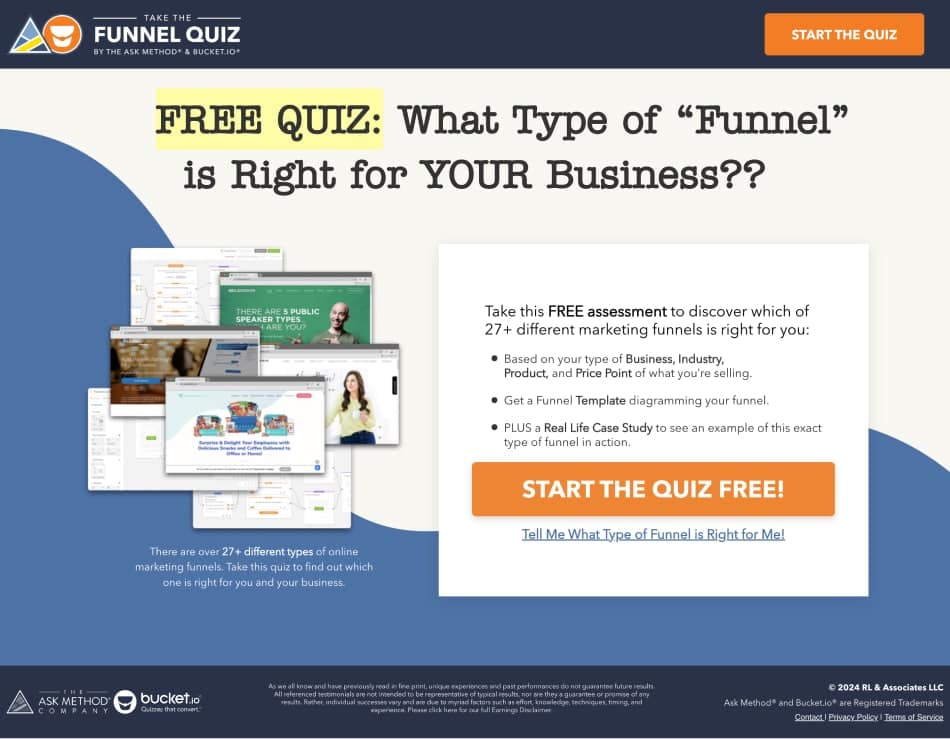
The Ask Method’s quiz funnel brilliantly demonstrates the “curiosity” approach we discussed earlier.
Their headline, “What Type of Marketing Funnel Is Right for Your Business?” instantly hooks entrepreneurs who want to know if they’re using the right strategy.
Their question sequence is strategically crafted to understand your business model.
Questions like “Are you selling one main product or multiple products?” and “Describe What You’ll Be Selling within this funnel” help categorize businesses into specific funnel types.
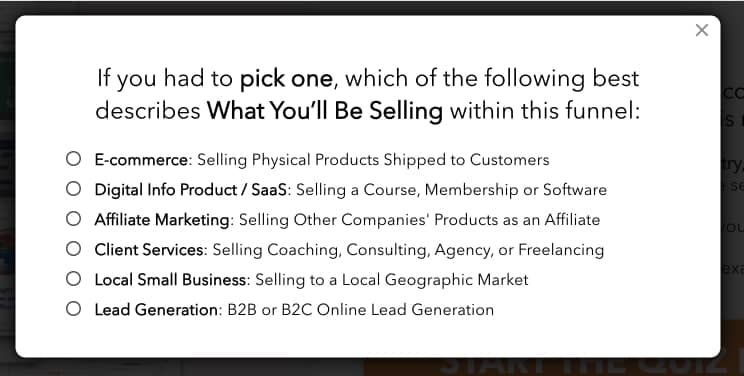
Each question builds anticipation for the perfect funnel strategy.
What’s really smart is how they handle the opt-in. Instead of just showing results, they offer a “FREE AMQF (For Affiliate Marketing) Quiz Funnel Report & Template.”
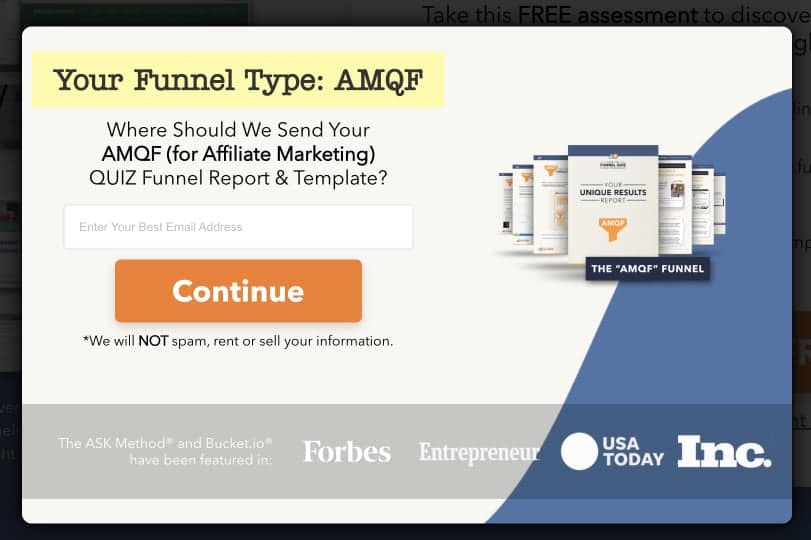
This makes sharing your email feel valuable – you’re not just getting a result, you’re getting practical tools.
The results page follows our earlier blueprint perfectly. They start with your funnel type (AMQF in this case), explain what it means, and then naturally transition into their Bucket.io 3.0 + AI workshop offer.
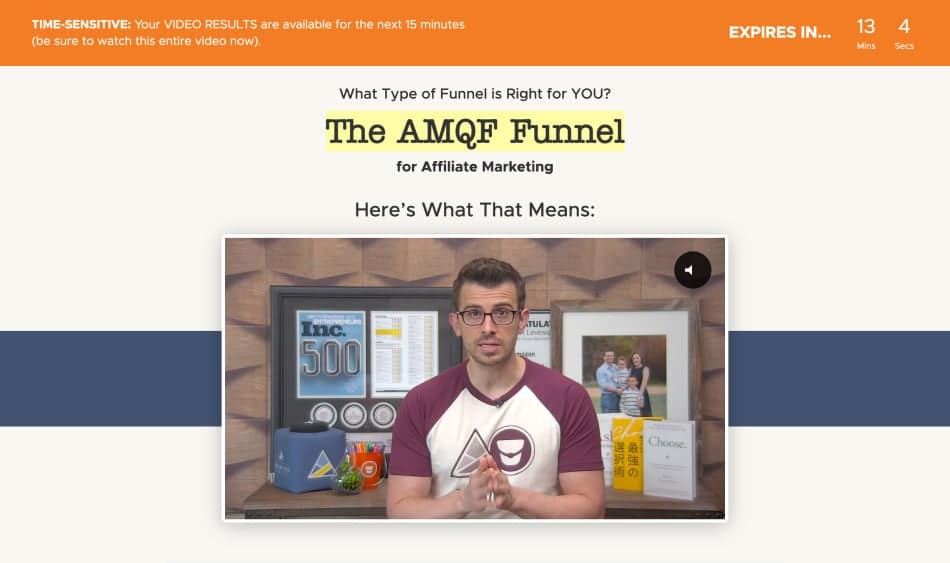
It works because when you see the offer, you already trust their expertise – they’ve just proven they understand your business needs.
This quiz funnel succeeds because it gives real value before asking for anything in return. It helps people understand their business needs first, then offers a solution that makes perfect sense based on their answers.
2. Wags Unite: A Fun Quiz for Dog Parents
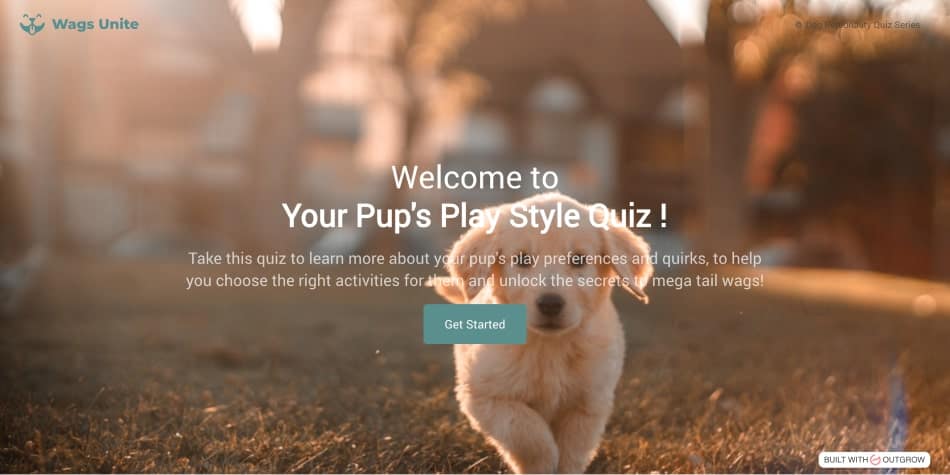
Wags Unite starts with something every pet parent wants to know: “Welcome To Your Pup’s Play Style Quiz!” They promise to help you understand how your dog likes to play and have fun.
Their questions are super fun – just like talking about your dog with a friend.
They ask things like “What does your pup do in an open field?” and “What’s your dog’s favorite game?” It feels more like sharing stories about your dog than taking a test.
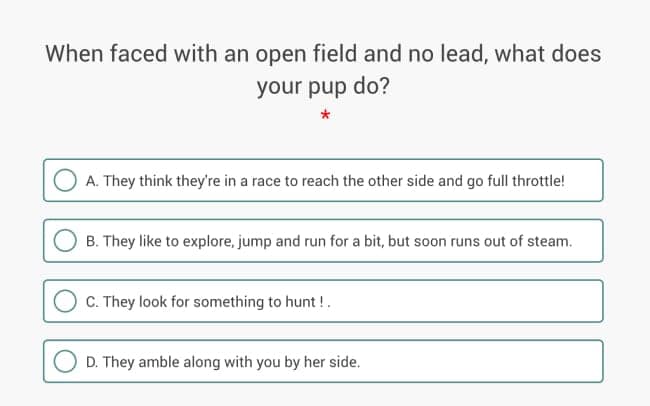
When it’s time to get your email, they keep it simple. They just ask “Where can we send you the results?” with spots for your name and email. No fuss, no pressure.
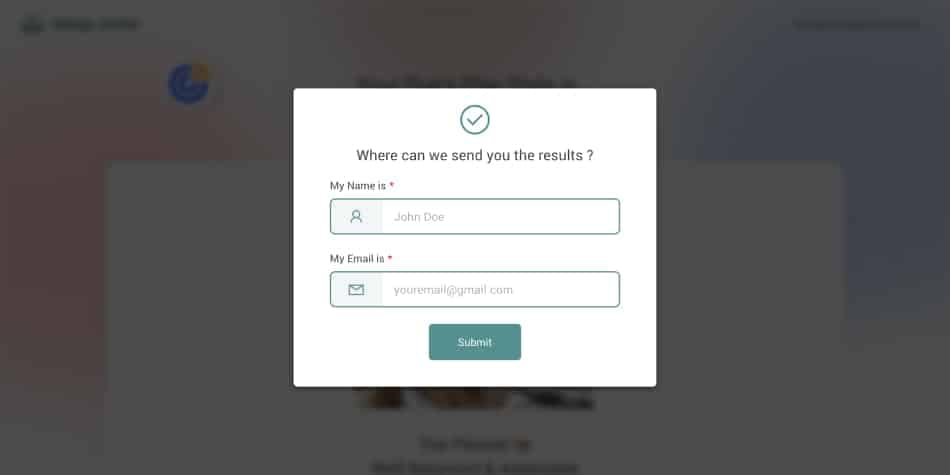
The results page is where it gets really good. First, they tell you your dog’s play style (like being “The Pleaser”) and explain why it fits your pup.
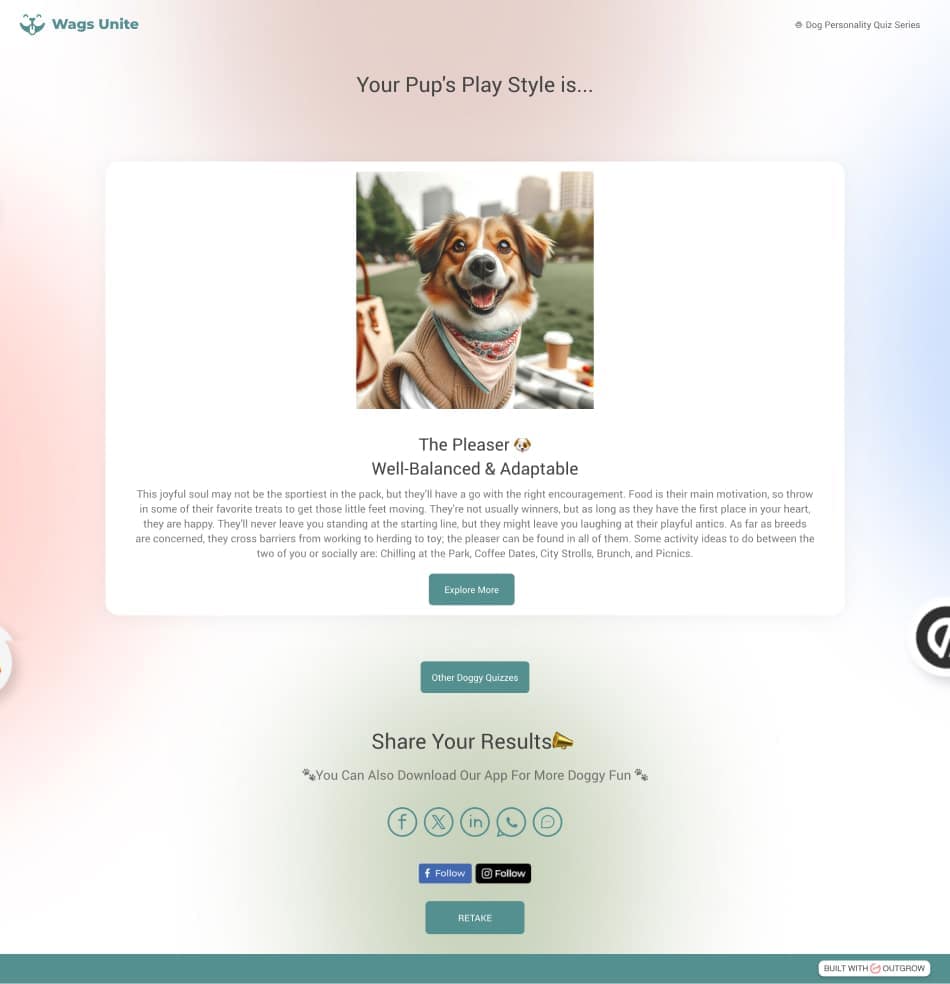
They make it easy to share your results too – because who doesn’t love showing off their dog? At the end, they invite you to get their app for more fun with your dog.
This quiz works great because:
- It’s fun and easy to take
- You learn something useful about your dog
- Sharing your results feels natural
- Getting their app makes sense after learning about your dog’s play style
What makes this quiz special is how it feels like chatting with another dog lover instead of filling out a boring form. That’s why pet parents love taking it!
3. Move: Making Fitness Personal and Fun
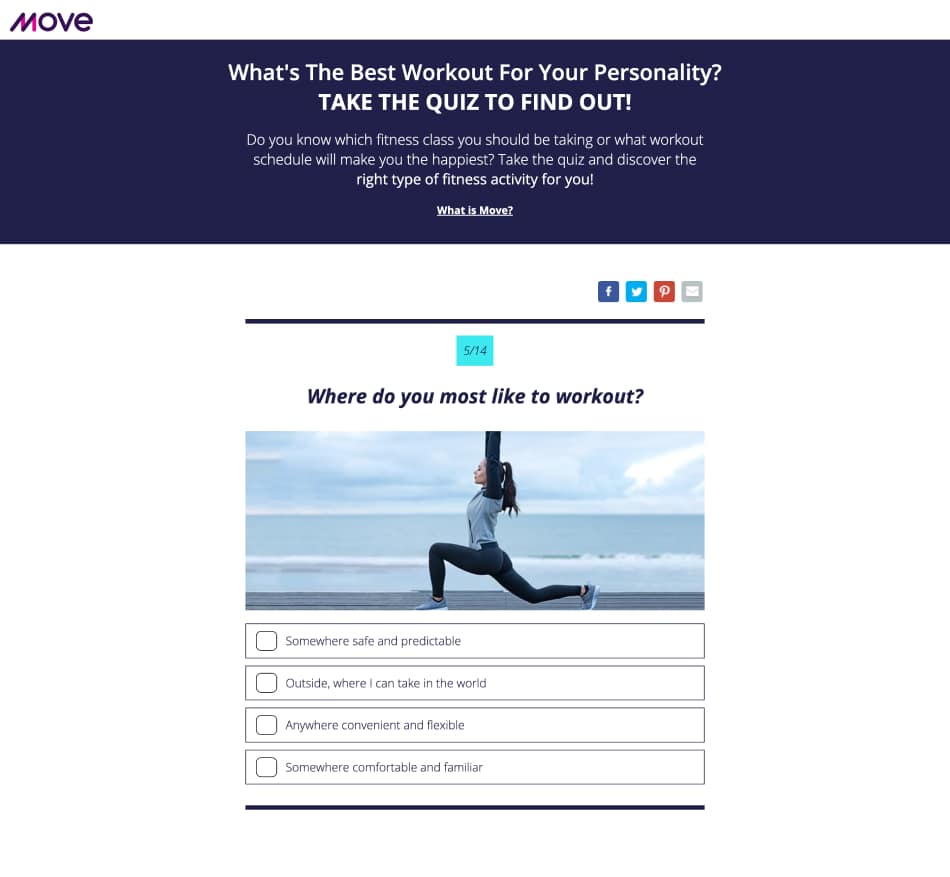
Move starts with a simple but powerful question: “What’s the best workout for your personality?”
The quiz takes you through 14 questions about how you like to exercise.
They ask things like “How do you feel about routines?” and “Where do you like to workout?” The progress bar shows you exactly where you are, so you know you’re getting closer to your answer.
They keep their opt-in super simple: just pop in your email to get your results, plus “the top 5 tips for your fitness personality.”
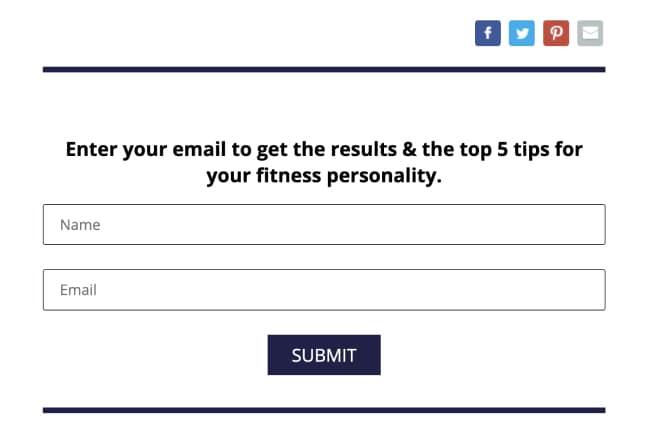
That’s a nice bonus that makes sharing your email worth it.
On the results page, they tell you your fitness personality (like being a “Fire” type) and explain what that means for your workout style.
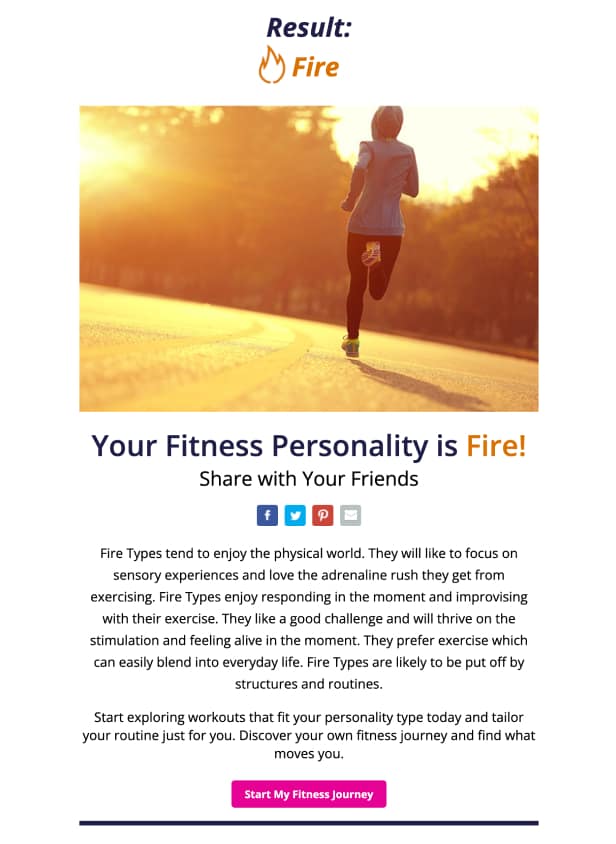
Then they make a friendly offer – try their membership for 14 days for just £1.
It feels natural because you’re now curious to try workouts that match your style.
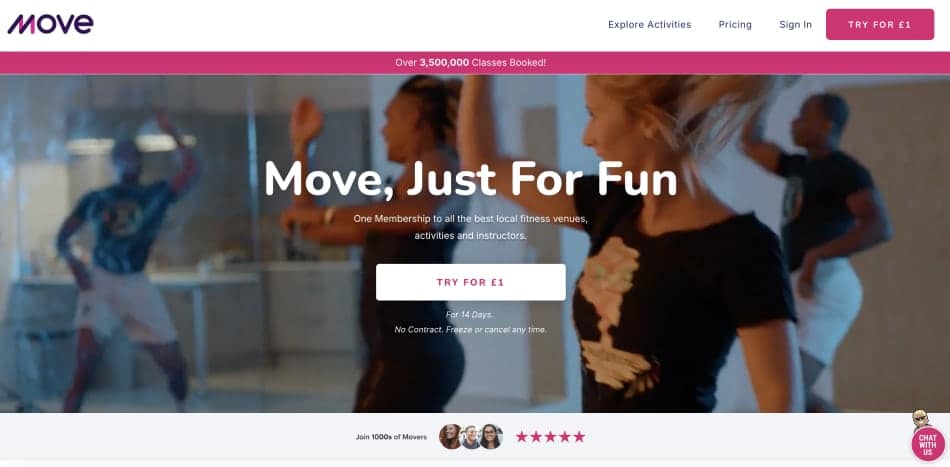
What makes this quiz work so well:
- It’s quick but thorough (14 questions with a progress bar)
- Focuses on how you like to exercise, not just what you should do
- Gives you useful results right away
- Makes trying their membership feel like the natural next step
This quiz succeeds because it puts personality first, helping people find workouts they’ll actually enjoy – not just ones they think they should do.
My 3 Favorite Quiz Funnel Software
1. ScoreApp: The Simple Quiz Builder for Small Business
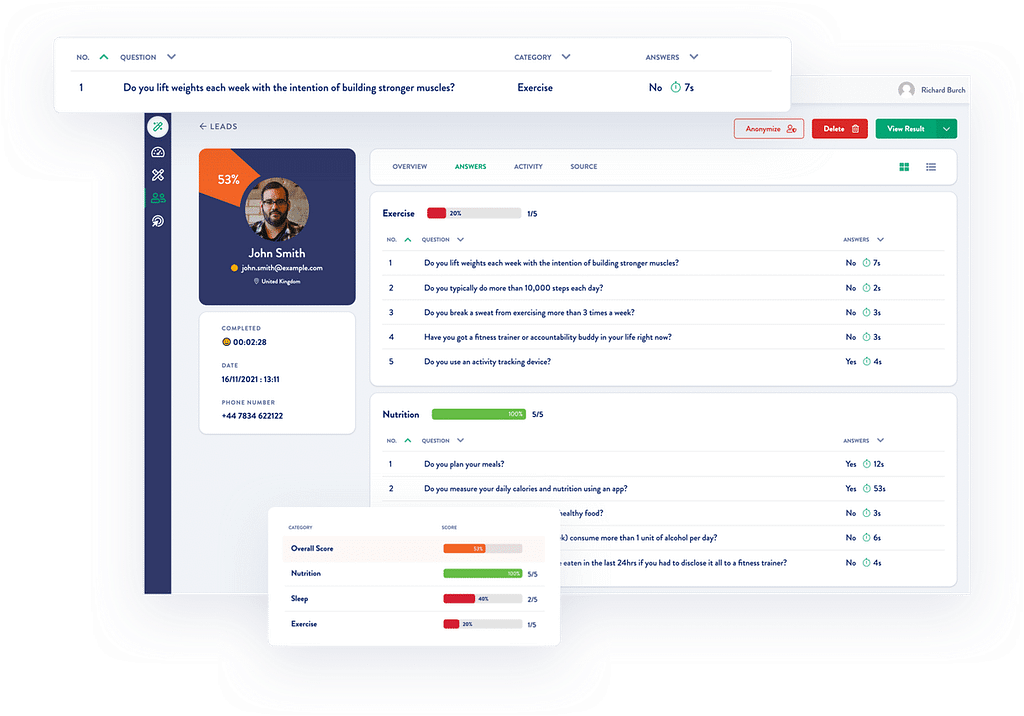
Let me share why ScoreApp is a great choice for quiz funnels, especially if you’re new to this or running a small business.
Here are 3 key features that make ScoreApp stand out and actually help your business grow:
- Done-for-You Quiz Templates: Instead of staring at a blank screen, you get proven quiz templates for different industries. Say you’re a fitness coach – just pick the “Fitness Assessment” template, change some text to match your style, and you’re ready to collect leads. Most people can build their first quiz in under an hour.
- Smart Scoring System: It automatically groups your quiz takers based on their answers. If you’re a business coach, your quiz could sort people into “Starting Out,” “Ready to Scale,” and “Advanced” groups. Then, you can send each group different offers that match exactly what they need.
- Visual Analytics Dashboard: You can see exactly where people get stuck or lose interest in your quiz. For example, if you notice 40% of people quit at question 5, you know to make that question easier. Or if most people pick “no time” as their biggest challenge, you can create content and offers focused on quick solutions.
The price makes sense, too – start at $39/month for the starter plan. That’s less than most people spend on coffee each month. Plus, their basic plan gives you everything you need: drag-and-drop builder, email integration (works with MailChimp, ConvertKit), and mobile-friendly designs.
You might need a bigger tool if you need fancy features like complex calculations or payment processing in your quiz. But to get started with quiz funnels and grow your email list, ScoreApp gives you everything you need without overwhelming you with options you won’t use.
Want to check it out? Try their free plan first (no credit card required) – it’s the best way to see if it’s right for your business.
2. Clickfunnels – When You Need More Than Just a Quiz
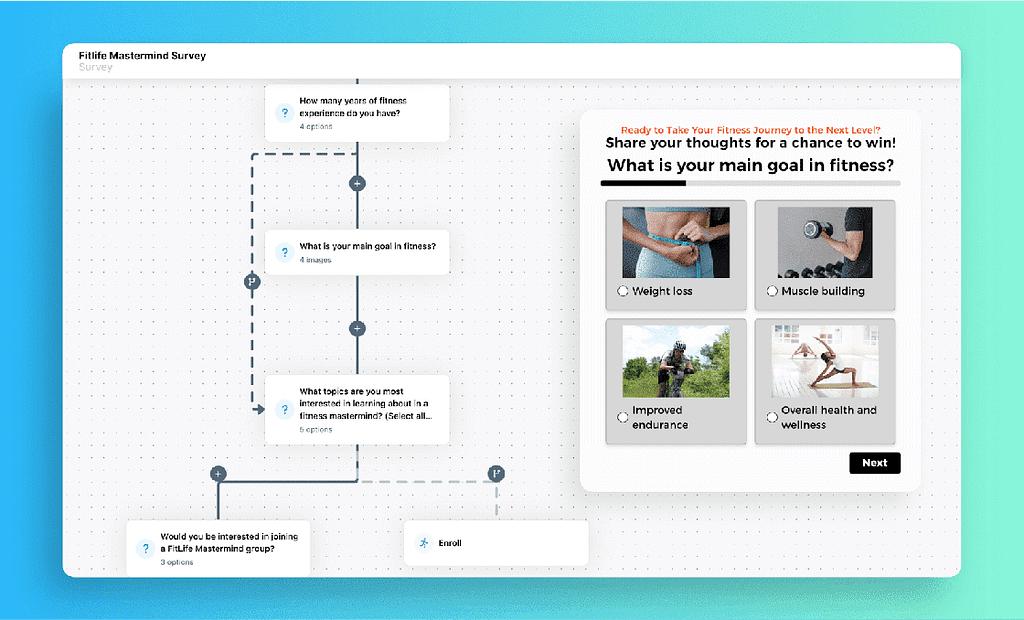
Yes, Clickfunnels is NOT designed as a quiz tool. It is an all-in-one marketing solution.
My team and I use it whenever we need our quizzes to do some serious heavy lifting in our marketing.
Here are 3 things that make ClickFunnels really powerful:
- Full Funnel Control: Unlike simpler tools that just do quizzes, ClickFunnels lets you build everything around your quiz, too. Want to sell a course right after someone gets their results? Easy. Need to add a special offer for people who score high? You can do that. It’s like having a complete marketing toolkit instead of just a quiz maker.
- Smart Question Paths: Your quiz can adapt based on how people answer. Let’s say someone picks “beginner” – you can show them different questions than someone who picks “advanced.” This means everyone gets questions that make sense for them, making your quiz feel more personal.
- Built-in Sales Tools: Want to sell something through your quiz? ClickFunnels handles payments, follow-up emails, and even text messages – all in one place. You can see exactly how many quiz takers buy your stuff and what’s working best.
Now, about the price – it starts at $97/month. Yes, that’s more than ScoreApp ($39/month). If you’re planning to sell products through your quiz or need to create different paths for different answers, ClickFunnels can actually save you money because you won’t need to buy other tools.
Honestly, if you only need a simple quiz to collect emails, this might be overkill. It’s like buying a truck when you just need to move a houseplant. But if you’re doing serious marketing through your quiz, ClickFunnels gives you everything you need in one place.
Want to see if it’s worth it? Try their 14-day trial and test out all these features yourself.
3. Involve.me – Best for B2B Companies & Professional Services
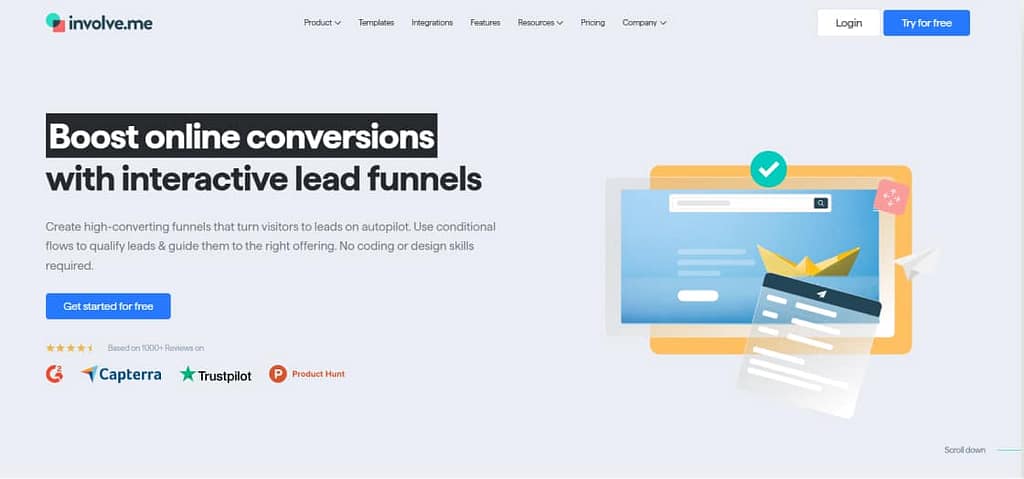
Involve.me is a tool that combines the simplicity of a quiz builder with the power of a complete funnel platform. It’s perfect for businesses that want professional-looking quizzes without the complexity of bigger platforms.
What makes Involve.me stand out? Here’s the reason why:
- Combined Quiz and Funnel Builder: Create professional quizzes and add sales pages and payment forms on the same platform. You get both quiz-building AND marketing features without juggling multiple tools. Perfect for creating complete quiz-to-sale journeys.
- Professional Templates: Start with ready-made templates designed for B2B and professional services. These look clean and corporate – perfect for making a strong first impression. Plus, you can customize everything to match your brand exactly.
- Smart Logic and Scoring: Build complex assessments with sophisticated scoring systems. Great for creating professional evaluations like “Business Readiness Assessment” or “Digital Transformation Quiz” that feel more like consultations than simple quizzes.
Starting at just $29/month, you get 5 live funnels. Sure, you’ll need to upgrade for advanced features like A/B testing, but that’s still amazing value for what you’re getting.
The basic plan offers you all the tools you need to create engaging quiz funnels that really make an impact! Why not begin with their free plan to explore all the exciting features?
💡 Pro Tip: The basic plan’s 5-funnel limit is usually sufficient for beginners. You can always upgrade later as your quiz marketing grows.

John R. Bryant
John R. Bryant, founder of Living With Funnel, is a funnel building expert and digital marketing strategist with over 10 years of experience. Specializing in conversion optimization and funnel building. His expertise in lead generation, email marketing, and CRM systems drives client success through increased conversion rates and optimized marketing automation.
Continue Learning With These Topics

